#which imo is important context to consider
Explore tagged Tumblr posts
Text
i feel like ppl push back against geoff's narrative by claiming he was the first to posit kon being actually kryptonian but this is just not true............. sb94 itself and wf3 both heavily imply/outright state that kon is a clone of superman with a small amount of stabilizing dna from paul westfield. this is an internal inconsistency with his established intro in rots and adventures of superman, but it's still like. in text stated. just look at hypertension arc. black zero talks explicitly about all the kons across the timelines being clones of superman who simply haven't grown into their full powers yet. geoff isn't the originator of this idea y'all he just retconned the human dna donor into lex instead of paul.
#also as a matter of personal opinion.#kon being an actual kryptonian clone works more elegantly in the narrative just like. occam's razor-wise#and the major reason he was established as being human emulating kryptonian powers is that there was that major editorial mandate#at the time it was prioritized that clark be the ONLY real kryptonian#this was later relaxed (kara. later versions of kon) but that was the driving force for superman during kon's creation#which imo is important context to consider#anyway. i keep seeing posts pushing back against fanon claiming this but it's just. that's not actually true#there are many real reasons to complain about geoff and about fanon without just making stuff up.........#this is the thing i was vaguely complaining about the other day btw. im still atm too lazy to go get citations#but is2g the power of spite might compel me soon#kon#rimi talks
45 notes
·
View notes
Note
hi, i hope you dont mind me asking this question! i often come across lists of reading recommendations for communists, and they are usually focused entirely on communist theory. which is important and im already on that, but i wonder if you also have recs for learning about history? especially the history of the soviet union, but also other past and present socialist states. i sometimes find myself reading theory and understanding the concepts in a vacuum, but with very little understanding of the historical context they were written in, if that makes any sense. and id like to get a basic grasp of the history of various socialist projects that isnt just the typical western "the ussr was evil!!!!" thing
Hi, historical context is indeed very important for works of theory, especially if it's more than a hundred years old. Lenin's What is to be Done, for example, is very conditioned by its historical context of Russia still being predominantly feudal, with only a timid appearance of the proletariat in St. Petersburg and Moscow, and therefore the very first trade unions, which he talks about. The understanding of these texts is amplified, and quite often enabled by knowing at least the basic historical context. Below I'll list the historical works I've read (and others) with some commentary, but I encourage anyone who has something to add to do so, since I am as of only recently getting more into historiography.
Anything by Anna Louise Strong (I've read The Soviets Expected it (1941) and In North Korea (1941), there's also The New Lithuania (1941), The Stalin Era (1956) and When Serfs Stood Up in Tibet (1959) for example). Her works, which I'd consider primary sources since they are written from her own experience witnessing events and talking to a lot of people, are extremely useful if you wish to form an idea about how some aspects of socialist states worked. The limitation of her works also resides in this specificity and closeness, these are not works that present a broad view of long processes, but a slice of the present with the sufficient historical context. They are still very, very good.
The Open Veins of Latin America (Spanish versrion), by Eduardo Galeno (1971). This one is focused on the history of imperialism in Latin America, how it evolved from the moment the first Spanish foot touched ground to the time it was written in (It talks about Allende before he was assassinated but after achieving power, for example). Perhaps it's not exactly what you're looking for, but it contains very important general context for any social movement that has happened since 1492 to 1971
The Triumph of Evil, by Austin Murphy (2002). I have mixed feelings about this book. While it insists on this weird narrative of absolute evil, which IMO takes away a lot of value from the overall points made, it is an astonishingly in-depth analysis of the economic performance and general merit of socialist systems against their capitalist counterparts. Most of the book is dedicated to comparing the GDR to the FRG, and both the economic and social data it exposes was very eye-opening to me when I read it about 2 years ago. If you can wade through the moralism (especially the beginning of the introduction), it's a gem. I've posted pictures of its very detailed index under the cut :)
Blackshirts and Reds, Michael Parenti (1997). Despite the very real criticisms levied against this book, like its mischaracterization of China, it is still a landmark work. Synthetically, it exposes the relationship between fascism, capitalism and communism.
Red Star Over the Third World, Vijay Prashad (2019); The Russian Revolution: A View from the Third World, Walter Rodney (2018). I'm lumping these two together (full disclosure, as of writing I'm about four fifths of the way through RSOtTW) because they deal with the same topic, Prashad being influenced by Rodney as well. Like both titles imply, they deal with the effects the October revolution had on the exploited peoples of the world, which is a perspective that's often lost. Through this, they (at least Prashad) also talk about the early USSR and how it functioned. For example, up until reading Red Star, I hadn't even heard of the 1920 Congress of The Toilers of the East in Baku, or the Congress of the Women of the East.
From here on I'll link works that I haven't (yet) read, but I have seen enough trusted people talk about them to include them
How to Cast a God into Hell: The Khrushchev Report, by Domenico Losurdo (2008). This one talks about how the period of Stalin was twisted and exaggerated through destalinization.
Devils in Amber, by Philips Bonoski (1992). This is about the Baltics and their historical trajectory from before WW1 to the destruction of the USSR (I'm not very sure on those two limits, perhaps they fluctuate a bit, but it definitely covers from WW1 to the 60s)
Socialism Betrayed, by Roger Keeran and Thomas Kenny (2004). This one deals with the process leading up to and the destruction of the USSR itself.
The Jakarta Method, Vincent Bevins (2020). This is about the methods the US used in the second half of the 20th century to stamp out, prevent, or otherwise sabotage communist movements and other democratic anti-imperialist movements.
I know some of these aren't specifically about socialist states, which is what you asked, but the history of its opposition is just as important to understand because it always exists as a condition to these countries' development and policies chosen.



405 notes
·
View notes
Text
The Colors of Crowley
Black is the color Crowley uses to cover himself, red is the color that represents Crowley to himself, and yellow is the color that represents Crowley to Aziraphale. What each color symbolizes and how it's used give us important information about Crowley (and to some degree Aziraphale) and about the ineffable relationship.
I feel kind of dumb writing this post because I'm sure it's glaringly obvious to everyone else, but there's this Metro UK article of all things (the Metro is owned by the hardcore rightwing Daily Mail, btw, so please don't link to it) that mentions the red stitching on Crowley's gloves in 1867, and it made conscious some details I had only subconsciously noted, so fwiw to anybody else, here are my notes on the colors associated with Crowley in Good Omens and their significance in the context of the way each one is used.
I don't think we need to cover black-as-evil in Western color symbology. [And yet here's a long-ass paragraph about it anyway! --Ed.] Light:dark::good:evil has been a thing with Christianity since before Christianity was even Judaism. The Israelites picked it up from the Zoroastrians way back before YHWH had subsumed El as 'God,' which may have been before they were Israelites as well; I mean it was a LONG time ago. Good Omens has been using black and white to represent Hell and Heaven, respectively, long before the show. In the UK, the book was published in paperback with a choice of black or white cover with an illustration of the contrasting character in the contrasting color: Crowley illustrated in black, Aziraphale in white. The current hardcover is grey.
Crowley wears black, and the Bentley is black. At the metanarrative or authorial level this is obviously for the purposes of the black/white demon/angel contrast, but on the intra-narrative level, the Watsonian level, it's interesting to note that Crowley doesn't have to wear black. He's obviously not free to choose from the full color palette, but Furfur's shirt and sash are is dark emerald green, Dagon is in ultramarine (as befits a marine Elder God), and Shax has only been on Earth for four years before she's wearing head-to-toe oxblood. When she shows up later in battle dress she's got a lot of oxblood there, too. And yet Crowley wears black.

Authorial reasons aside, black suits Crowley for a couple intra-narrative reasons. For much of history, black was the most expensive color to dye and maintain in clothing, and as a result it has always been fashionable. And for several centuries in Christendom, wearing black was also a sign that you were in mourning, which was a social and religious obligation when someone close to you died. Whether you could wear other colors with it depended on how long ago that death had occurred.
Again: black is what Crowley chooses to cover himself, and as there is a sharp distinction between how Crowley presents himself to fulfill his obligations and who he thinks of himself as being, there is likewise a distinction between the colors that represent those two quantities as well.
Red is the color the show uses to represent Crowley to Crowley. The most obvious reason is his hair. This is another change from Book Omens, where Crowley is described as having hair that is "dark." A lot of fans in the UK hated the change when S1 came out because fans hate change and the British have a thing against gingers, but Crowley's red hair suits him better than dark imo because the Mother of Demons in Jewish religious literature, Lilith, is traditionally depicted with red hair. Red hair has been associated for more than a millenium in the Middle East and England and Wales with sorcery, witchcraft, demonic influence/possession, and satan-worship.
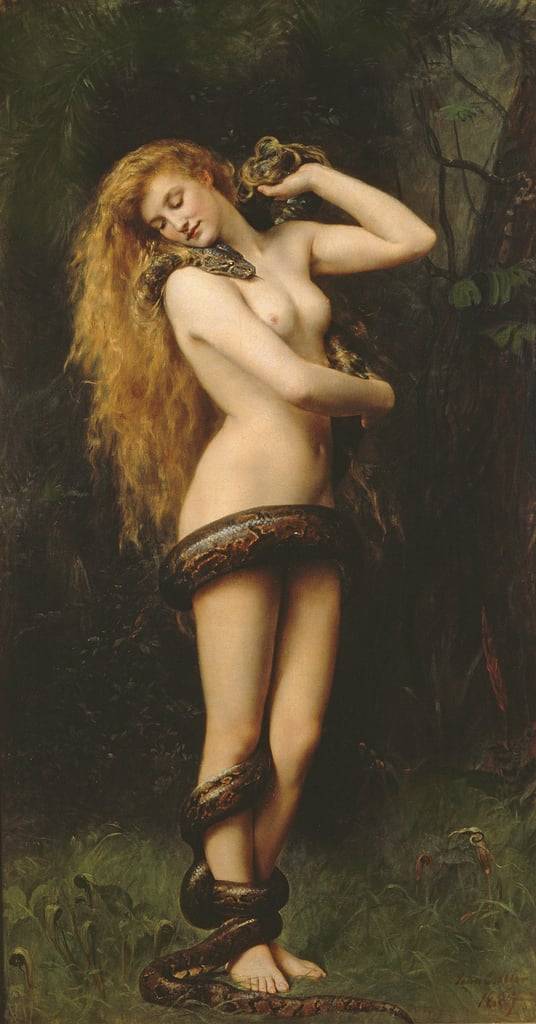
Crowley wishes his mom was this cool with snakes.
A good case can be made that Crowley genuinely likes the color red in addition to considering it demonically appropriate. I say this for three reasons. Firstly, because when he has a (limited) choice of (again, demonically appropriate) colors, he always chooses red. The marble of the desk in his apartment is not green or grey. He can have any color stitching on his gloves or lining of his jacket collar he wants, but it's always red. Secondly, it's not only red he chooses, it's almost always bright red.
We know Crowley's red isn't supposed to represent blood or violence, because we have another demon character whose use of red represents just that, and it's not the same red:
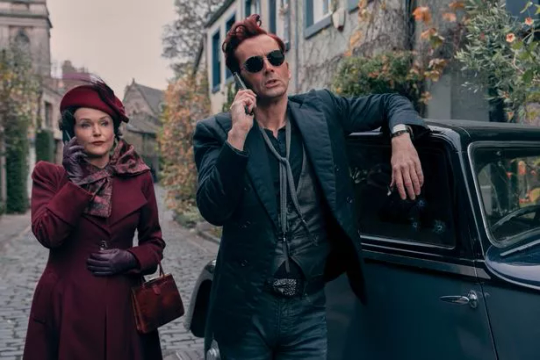
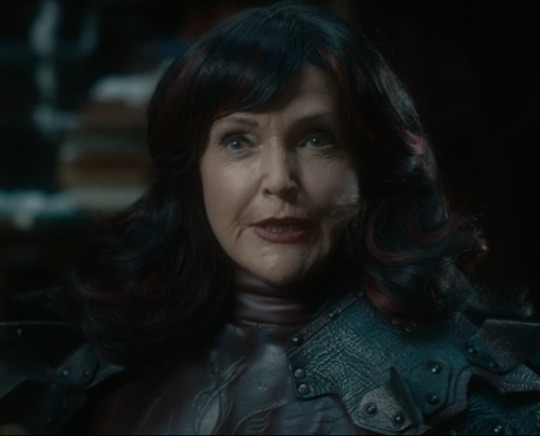
Compare Shax' oxblood and burgundy to
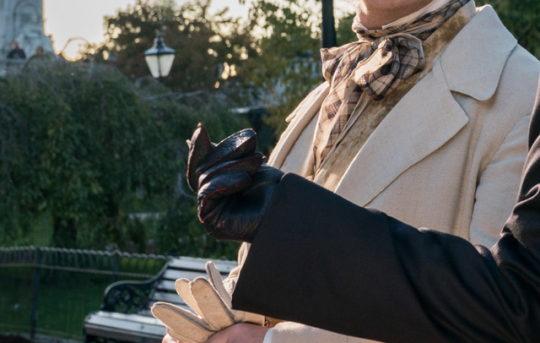
and
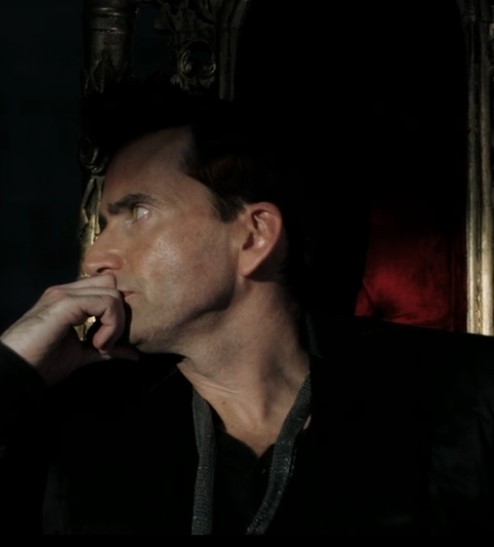
and
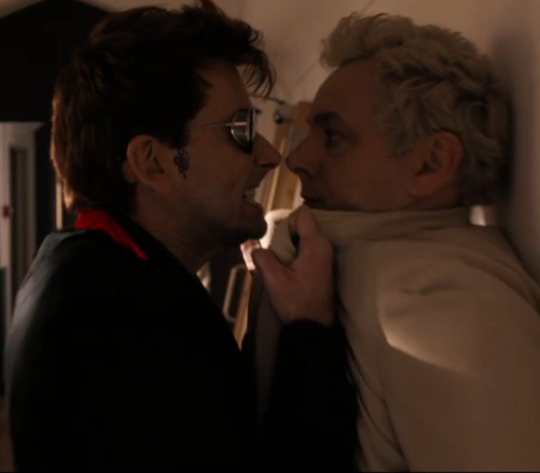
and
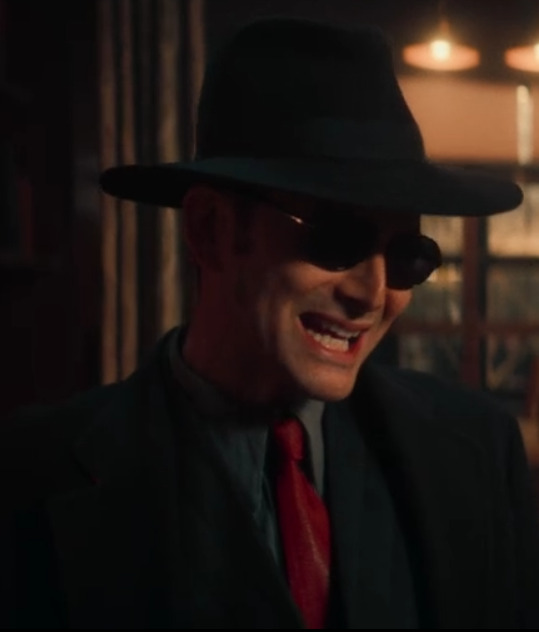
Crowley's red isn't just red, it's lipstick, cherry, crimson red. And in case we weren't sure that we should read this red as symbolizing passionate, romantic love:

Romantic symbolism aside, bright red is also the color of passion (romantic or otherwise), optimism, heat, vitality, life, (hell)fire, and warning.
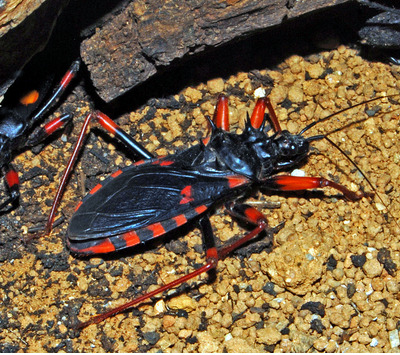
Red and black says don't fuck with Jack.
The third reason I think we can safely say that Crowley actually likes the color red is that he hides it. It's always tiny little touches, some of which you have to look for to see. (I still don't know where they snuck in the red on his Elizabethan habit, e.g.) And we know this color is a risk for him, and that he is right to hide it, because Ligur, who doesn't approve of any of Crowley's less-than-fully-demonic embellishments and may share Hastur's opinion that Crowley has gone native, comments on one of Crowley's more noticeably colorful items.
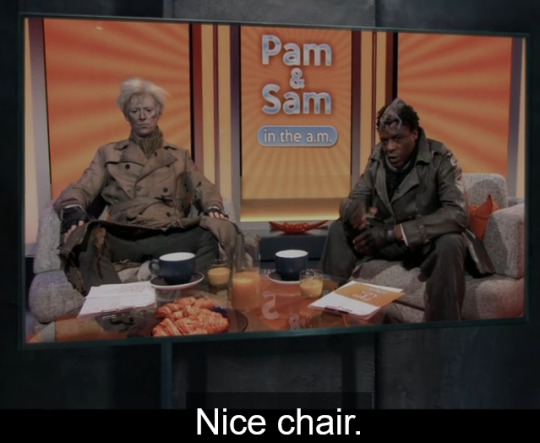
And I think the red tells us one more thing about Crowley, too.
Bright red is the colorest of colors, you know? When we can choose only one color to represent all colors, to represent colorfulness itself, we choose bright red (even in cultures where red symbolizes other meanings than it does in Western art).
Remember how Aziraphale gives Crowley's jacket a tartan collar when he swaps bodies with Crowley and impersonates him in Hell because Aziraphale feels the need to maintain some small secret token of his identity, some tiny unremarked sign of something he loves and thinks is beautiful, when he is down there alone in the gloom among enemies?
Crowley is down there alone among enemies every second of every day and night, whether he's in Hell or on Earth. And he's already had his identity stripped from him once. If you were someone who said
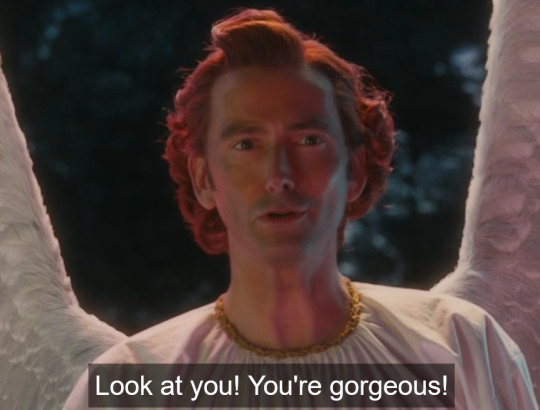
about this
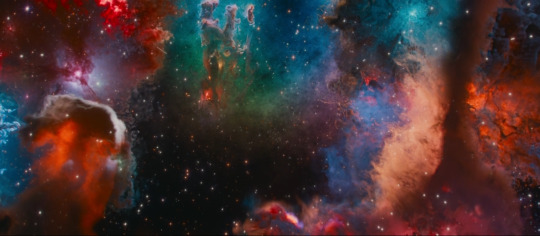
and then you got recruited by the fash downstairs bc the fash upstairs threw you out for not being fashy enough and you had to start wearing nothing but dark colors and more importantly had to hide everything that made you feel warmth or softness or joy, and that was it, that was the deal for eternity, but you could add one (1) little touch to everything you wore to remind yourself that there is some beautiful part of you left, something you loved once, that no one has yet been able to steal or brutalize out of you...what color would the stitching on your gloves be?
Lastly, Yellow represents Crowley to Aziraphale. I'm going to skip the chain of evidence for this bc I think it's obvious, but the way it's used also lends itself to some inferences supported in other areas in the show.
Here's where I think changing Crowley's hair to red from Book Omens' dark is a good decision in another way. Crowley always has red hair, and if he has any color in his clothes it's going to be red. Red is eye-catching; it always stands out, but it doesn't stand out as demonic. And yet the color Aziraphale associates with Crowley and calls "pretty" isn't red.
I suspect that when Aziraphale says he can make Crowley an angel again, Crowley hears "You're not good enough for me to accept you as you are, let me fix you" because these are words Aziraphale has said to him many times, and has meant some of those times. But

tells the audience differently. The color Aziraphale associates with Crowley, the color he calls "pretty," is the color of Crowley's only overtly demonic feature. Aziraphale doesn't love the angel he knew who isn't Crowley, he loves Crowley, the demon, the person he is now, his yellow demon irises.
Yellow appears in three other places in S2, and they're all symbolically significant, and in fact serve to establish another symbolic significance to the color yellow in addition to that of Yellow Is the Color of My True Love's Eyes.
One of them is a feather duster:

Crowley reacts to a feather duster like a cat confronted by an unfamiliar object
The other three are private conversations between Aziraphale and Crowley:

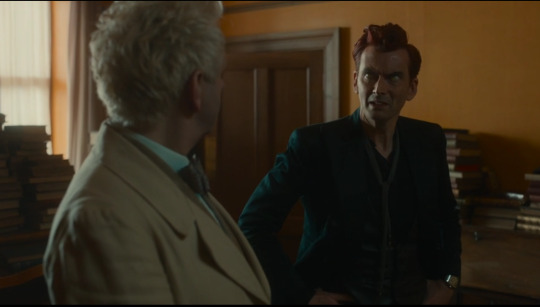

The walls that surround Crowley and Aziraphale when they speak openly about their situation and how they will handle it are drenched in yellow, and that is super interesting, because in Western color symbolism yellow is the color of fear. The archangel of whom Crowley and Aziraphale are both (rightly) terrified wields a tool the color of fear. The color of fear saturates the backdrop of conversations between Aziraphale and Crowley when they have to discuss their situation and their actions openly.
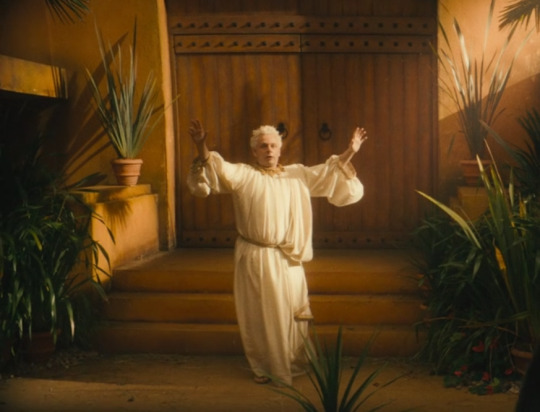
Remember how Aziraphale's voice shakes here?
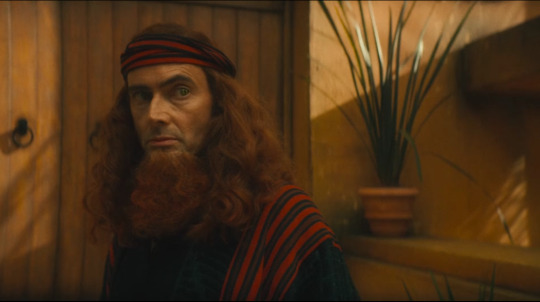
Crowley realizes the crows have just handed an angel evidence the angel can take to Hell and use to have Crowley killed
Even the Bentley, that clear sign of Aziraphale's love for Crowley, is also a yellow coffin enclosing him. For Aziraphale, thoughts of Crowley are always entangled with fear, because Crowley is not just Crowley, he is also Crowley's Fall.

And I think fear is what Crowley's eyes themselves represent. For Crowley, fear is now a fundamental part of his perception, his nature, his identity.
The angel Aziraphale once knew is not Crowley, and yet from what we've seen, the chiefest difference in character between this sweetheart and this mischief-maker--

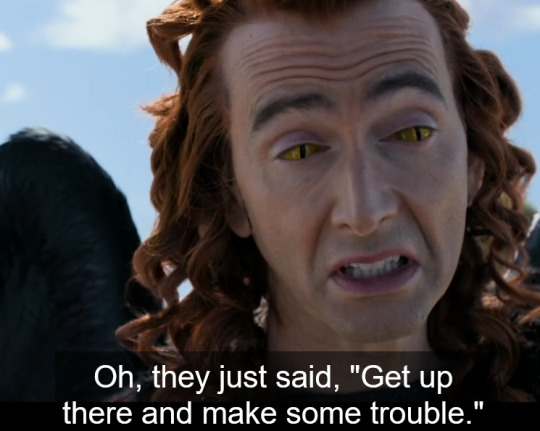
--is that the Starmaker does not know yet that he should be afraid, and the Serpent does. That knowledge and its fear has, shall we say, colored his view of the world.
Aziraphale learns that fear early by observing others rather than Falling himself, and knows enough that by the first time we meet him in the Before, he is already afraid.
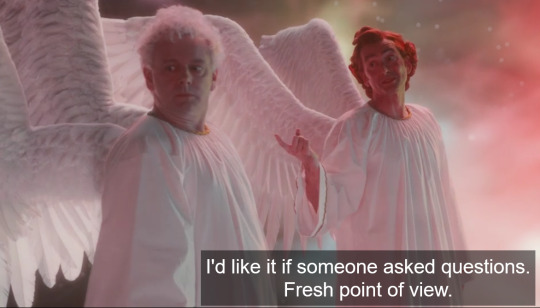
Pink was once symbolically equivalent to red; in modern Western color symbology it is a color of innocence, youth, beauty, and first love. Hashtag just sayin'.
The cruellest thing this suggests to me is that, rather than rebellion or his propensity to ask questions, rather than the knowledge of good and evil, the Starmaker's Fall was caused by his innocence. it wasn't the questions that were the problem: it was that he didn't know any better than to speak them out loud.
Y'all, Crowley and Aziraphale do not suffer from communication problems. Despite both being male-coded and British, they don't even seem to lack emotional intelligence. What they do have is a universe of silence and fear they have to communicate within and around. What they lack is the safety to speak and love freely. The true color of Crowley is crimson, but someone gave him those eyes, and Aziraphale either watched that happen or knew about it, and now Crowley covers himself in black--which btw is also the symbolic color for mystery and secrets--and only lets Aziraphale see him as he really is now, because Aziraphale won't judge him for his yellow eyes (or punish and forsake him for his questions). Because Aziraphale carries that fear with him too.
#good omens#good omens 2#good omens analysis#good omens crowley color analysis#good omens crowley color#crowley#good omens colour analysis good omens crowley colour#good omens colour#good omens meta#angel!crowley#starmaker
1K notes
·
View notes
Text
I think I've found the most tragic ship in BG3 and I need to rant about it
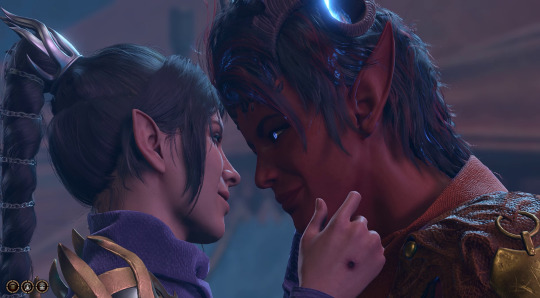
I've seen a decent number of people discuss and write about Dark Justiciar Shadowheart, but they always focus on what she's like post-game when she's fully committed to Shar. Which is a fine thing to focus on! Especially when you're writing smut where she's a mean domme. Post-game DJ Shadowheart is a fascinating character. But I feel like people neglect to consider what she's like during the transition phase of Act 3, where she's become Shar's Chosen but hasn't yet Done The Thing that caps off her personal questline. And there is SO MUCH potential for angst and drama during that time frame.
IMO the most important aspect of this stage of her development is that she is not evil yet. She simply made a single bad decision and now she feels like she's in too deep to do anything but double down on it. She's spent her whole life trying to "fake it 'till you make it" and she's only just now starting to transition out of that and into sincere belief. All the misgivings and insecurities she's shared with you are still there, just buried deeper. That desire to love others and do good hasn't yet been completely stamped out. In my Dark Justiciar Origin run, I try to do good things whenever possible as long as I can find a way to rationalize it as benefiting Shar. (but I still ended up saying enough evil-sounding things to make Minthara incredibly horny for me)
So where does Karlach fit in?
Well, turns out when you play as Origin Shadowheart, Shar doesn't make you break up with your partner. In fact, Shar says absolutely nothing to you about your romantic situation. This is really weird if you're romancing anyone other than Karlach, but I think it makes perfect sense for Shar to tolerate a relationship with Karlach for the time being. It's the ideal opportunity for Shar to prove a point. Karlach is dying, and no matter what Shadowheart does, this relationship is going to end in painful loss. Shar wants Shadowheart to fall in love with Karlach only to have that love abruptly ripped away from her. It perfectly demonstrates everything Shar believes about love: that it's fleeting and will always hurt you in the long run. Better to just avoid it entirely so you don't get hurt.
And Shadowheart knows all this. She's studied Sharran scripture extensively, after all. She knows that Shar is trying to teach her a lesson, she knows that the longer the relationship lasts and the more emotionally intimate it gets, the more the end is going to hurt. So why doesn't she break it off? Partly it's because she loves Karlach and doesn't want to end things; she's probably in denial at least a little bit. But I think it's also partly because she's a bit of a masochist. She thinks she deserves to suffer because she knows, at least subconsciously, that she's still not a very good Sharran. She can see the loss coming and she hopes the experience will bring her closer to Shar.
You'd think Karlach would be unwilling to put up with DJ Shadowheart's fanatical bullshit, but personally I think Karlach would stick it out for a whole mess of reasons. Number one, she can still see the good in Shadowheart and she refuses to give up on her partner. She's clinging tightly to the hope that Shadowheart can still be redeemed, even though she probably understands that it's a long shot at best.
Number two, she blames herself. When you play as Tav/Durge or another Origin, Shadowheart will have a conversation with you before deciding what to do in the Shadowfell. But if you play as Shadowheart, none of your companions says a word to you. In the context of this ship, I choose to interpret that as Karlach being too trusting. She's seen the good in Shadowheart, after all. She's so certain Shadowheart will do the right thing that she doesn't think she needs to speak up. It's not until too late that she realizes what Shadowheart needed was for someone to say "hey, are you sure about this?" So now she feels she needs to make up for that failure somehow by continuing to try and nudge Shadowheart in the right direction even though it seems impossible.
And number three, Karlach's just plain lonely. As fucked-up as this relationship is, she's still getting companionship and intimacy, and she doesn't think she has time to cultivate a new relationship if she breaks up with Shadowheart. She wants someone to be with her and hold her hand at the end, even if that someone is a brainwashed cultist.
In sum, both of them know that their relationship is extremely unhealthy; that it's hurting them now and will hurt them more in the future. But they both refuse to end it for their own reasons. And good gods, the ANGST. ARE YOU FEELING IT NOW, MISTER KRABS?
338 notes
·
View notes
Text
I don't know if this is common knowledge, but Komaeda's talent in Japanese is not "Ultimate Lucky Student". It is "Ultimate Good Fortune" (or good luck).
I know the word "lucky" has connotations with being good luck, but "luck" itself seems neutral to me at least.
I think the fact Komaeda is praised for, and has his talent be centered on, his good fortune is a very important nuance. People only see the good that happens to him. People keep telling him what happens to him is "good luck". His parents dying and getting kidnapped end up being called "good luck" in the end. I think this reinforces his pattern of thought more than people just saying he has extraordinary luck (good and bad). It's a minor difference, but it adds a lot. I have been thinking about this for a little bit now.
Because of the fact it is good luck specifically, I wanted to find parts where Komaeda specifically talks about bad luck. Lines such as "my awful luck/dreadful luck..." doesn't make much sense in the context of his Japanese talent. It made me wonder if those English lines even existed or if it was a "Luke, I am your father" situation. I don't have either the English or Japanese script memorized.
I checked the Freetime Events because of this, and found an interesting thing. There's a number of mistranslations, or simply translation choices I don't really agree with.
The freetime events heavily misrepresent how often Komaeda uses the word "luck". He uses both 不幸 and 不運 an equal amount I'd say. Maybe the former more. The former means "misery" "sorrow" or "misfortune". The latter means "bad luck" or "ill-fortune".
Likewise, 幸運 means good luck, but it also means good fortune. It's the word used in his talent as I described above.
Now, that's not to say I think Komaeda's "talent" should not be referred to as luck, nor am I saying he should never use the word luck. I think good and bad luck is a perfectly apt English word to describe his experiences. I just think the English translation overuses it. It wouldn't have killed them to make him say "isn't that just awful" or "what a tragedy, right?" instead of "isn't that such bad luck?" every conceivable moment. Maybe I'm just nit picky.
Now, onto the free time events. I want to talk about them.
I'll be talking about them in order as they appear. Also, I am only going to talk about the 3rd event onward, after Komaeda's chapter 1 reveal.
Freetime event 3
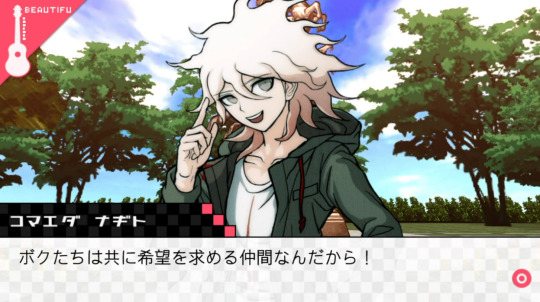
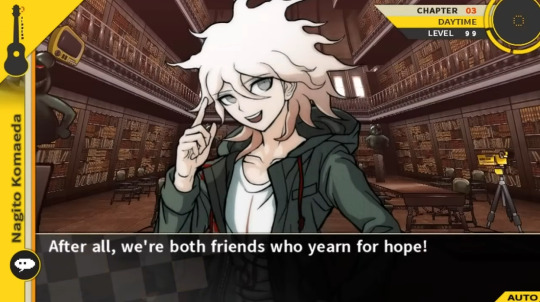
A minor nitpick, but "friends" is not the word I'd use here. It's true you can translate it that way, but considering everything else about Komaeda, at this point in the game, he wouldn't readily call Hinata his friend. Especially considering the connotations that holds for him.
That's precisely likely why he, in fact, doesn't say "friend" in the Japanese text. He uses 仲間 which like I said, while can and does translate as friend when used in that way, it just means people of a common thread. Like, a group, I guess.
My TL:
Because we both share the common goal of seeking out hope!
Freetime event 4
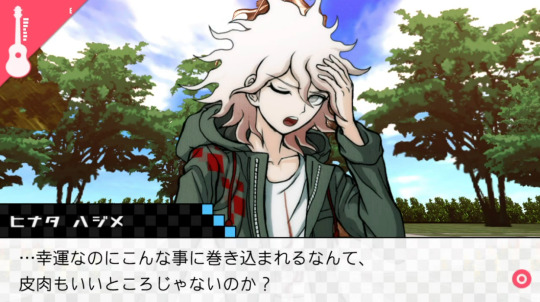
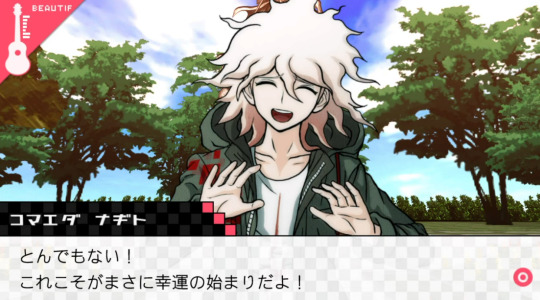
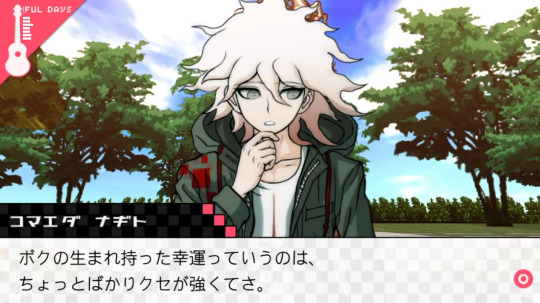
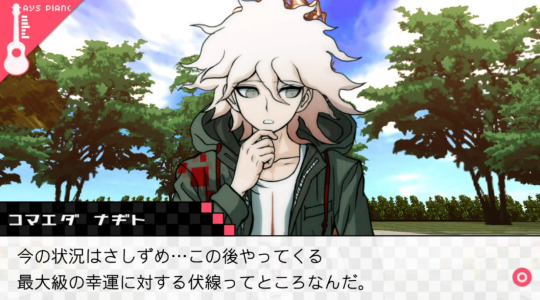
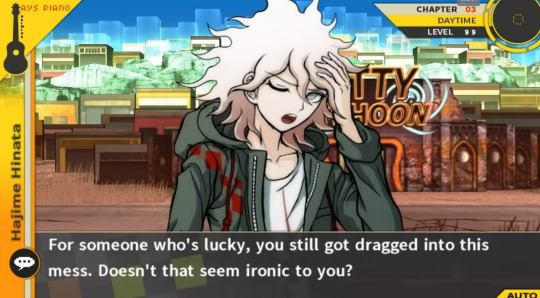
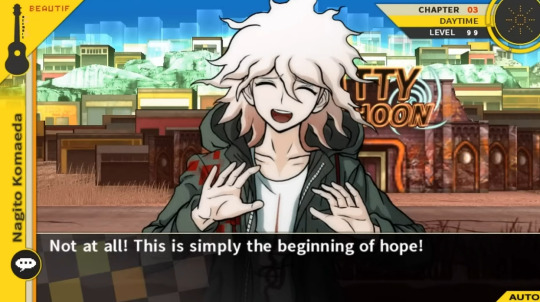
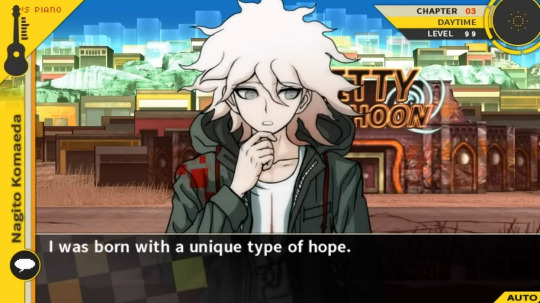
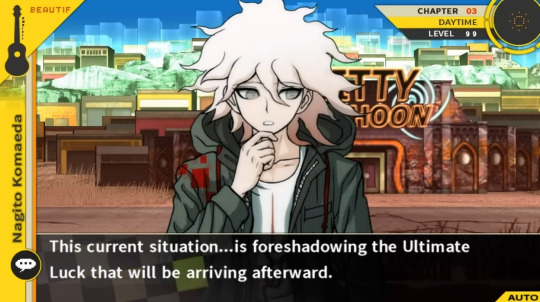
This is a really bad translation IMO. Hope is never said once in the original dialogue. I don't know why they put it there.
My TL:
Hinata: It's pretty ironic that you got wrapped up in this shitshow considering your "Ultimate Good Luck". Komaeda: It's not ironic at all! This is no doubt just the beginning of the good things to come my way! Komaeda: Um, let's just say the "good luck" I was born with is a little less straightforward [than the name would suggest]... Komaeda: once this is all over, I'll be rewarded with good fortune of the highest caliber.
And though this next one isn't much of a "mistranslation", I want to offer an alternative translation that highlights my criticism of "overusing the words good/bad luck".
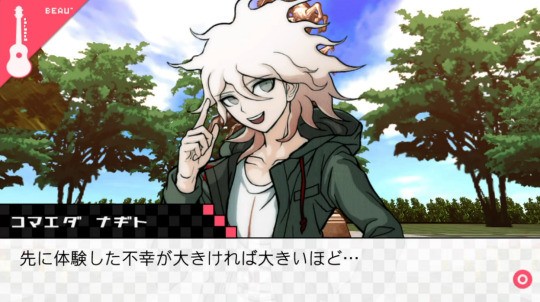
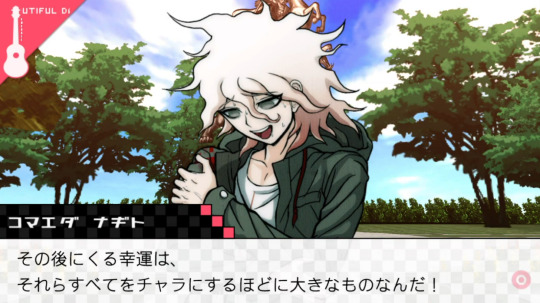
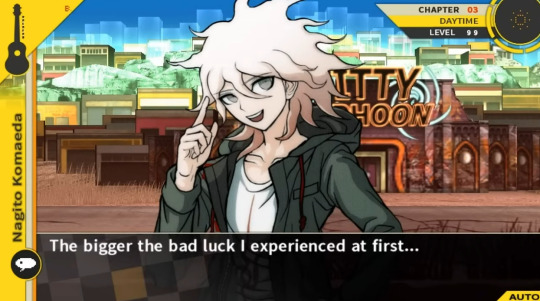
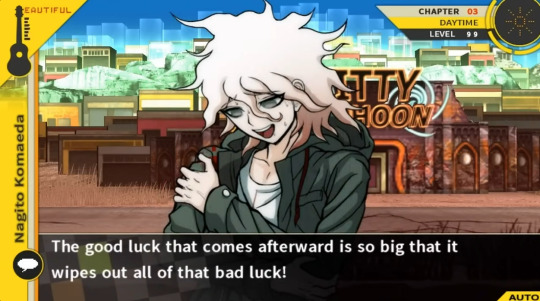
My TL:
Komaeda: The greater the misfortune I experience before hand...the greater the good that comes my way afterwards! It completely cancels out everything before it!
Freetime event 5
I sadly cannot find in-game pictures of this since it's one of the wrong dialogue choices, so here's the script file text for it instead (sorry)
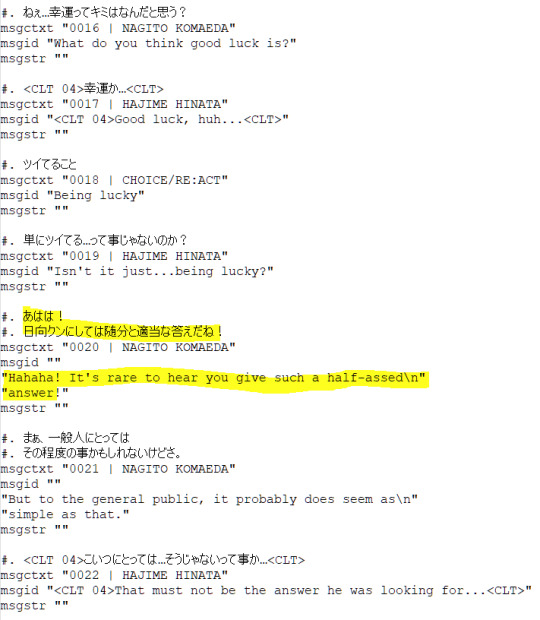
I remembered this line in English specifically because I always thought it sounded weird for Komaeda to say - "It's rare to hear you give such a half-assed answer".
While not a mistranslation totally, I think the tone is a bit off.
I would write it more as, "Ah ha ha! That's quite the answer, Hinata-kun!"
It literally translates as "for Hinata-kun, that is a very suitable answer!" but it's clearly supposed to be teasing/sarcastic. So he means to say "oh, wow, Hinata-kun, you're answering with that?" but in a lighthearted tone.
Freetime event 6
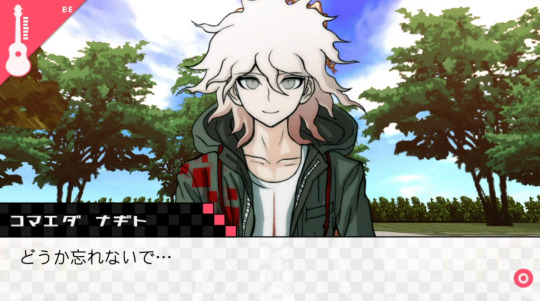
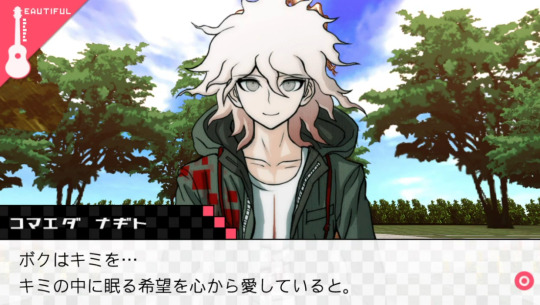
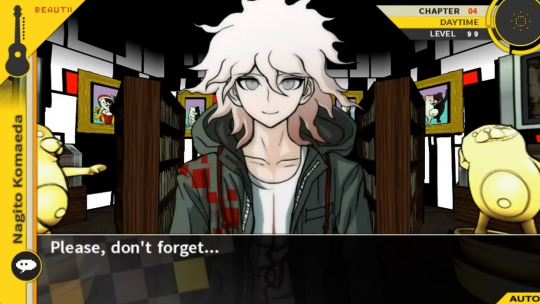
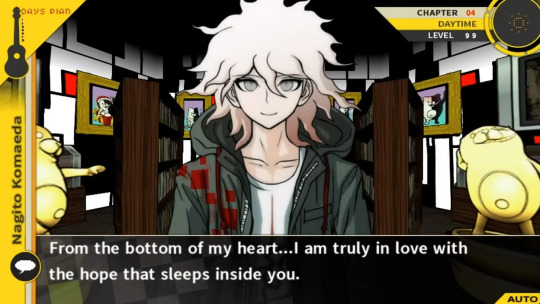
Almost didn't include this because it's the mistranslation we all know and hate, but it's worth mentioning in case people don't know.
My TL:
Please, just one last thing...don't ever forget...that from the bottom of my heart, I love y...I love your hope that sleep dormant inside you.
Though he does just say "please, don't forget", he uses どうか which is a pretty polite turn of phrase for Komaeda. It also is a way to emphasize a request, as in please do this to the benefit of me.
He backtracks pretty heavily. The verb comes at the end in Japanese sentences, so giving an exact one-to-one would be hard, but I'll try to explain it.
ボクはキミを... キミの中に眠る希望を心から愛していると。
Boku wa Kimi wo... Kimi no naka ni nemuru kibou wo koko kara aishiteiru to.
の/no = possessive. Such as, "Lucy's cat" "David's car".
を/wo = verb particle. There's no real English equivalent but you use it to signify some verb is being done onto something. Such as, "I kicked the ball" ("ball wo kick") or "I pet the cat" ("cat wo pet").
は/wa = topic particle. Commonly translates as "is/am" but that is NOT what it means. It just signifies everything that comes after it relates back to what comes before it. It's most accurate to think it as "as for the topic of..." Such as, "my damaged car wa had to go into the repair shop." After wa, "had to go into the repair shop", you ask, "what had to go into the repair shop?" you can find the answer in the topic, which is before wa: my damaged car. (or... me no damaged car.)
So, with this knowledge, let's break down the sentence.
Boku = I/me.
Kimi = you.
So this would make Boku wa Kimi wo in it's most literal form: as for the topic of me (aka, speaking for me), I, onto you...
Then he trails off. wo becomes no.
I, onto your hope sleeping inside of you...
and then we return to wo:
from the bottom of (one's) heart, love [the hope sleeping inside of you].
One could easily see it as Komaeda quickly changing the wo to no to add extra steps to not make the confession so head-on. Because if we remove everything after no and just continue where the wo leaves off, we get:
Boku wa Kimi wo koko kara aishiteiru to.
As for me, I, from the bottom of my heart, love you.
Now...one could also read it as him not backtracking, but adding. Saying I love you and the hope that lies dormant within you. Both are equally plausible. Listening to the audio it can go either way, but the way he quickly and softly drops off when he gets to the first wo makes me feel like it's a backtrack. Or maybe the background music is just too loud haha.
Well, that's all I got for now.
107 notes
·
View notes
Text
Melinda and demetrius: splitting and dissociation (part 2)
I was talking in the first part here about Melinda and her splitting episodes. In this part I will talk about the oldest son demetrius.
There's no lie in the fact his appearance was surprising, but also everyone knew that he didn't seem right.
But also he's very mysterious and understanding him is quite a challenge with the very little context we have of him. So let's dive into his character a little.
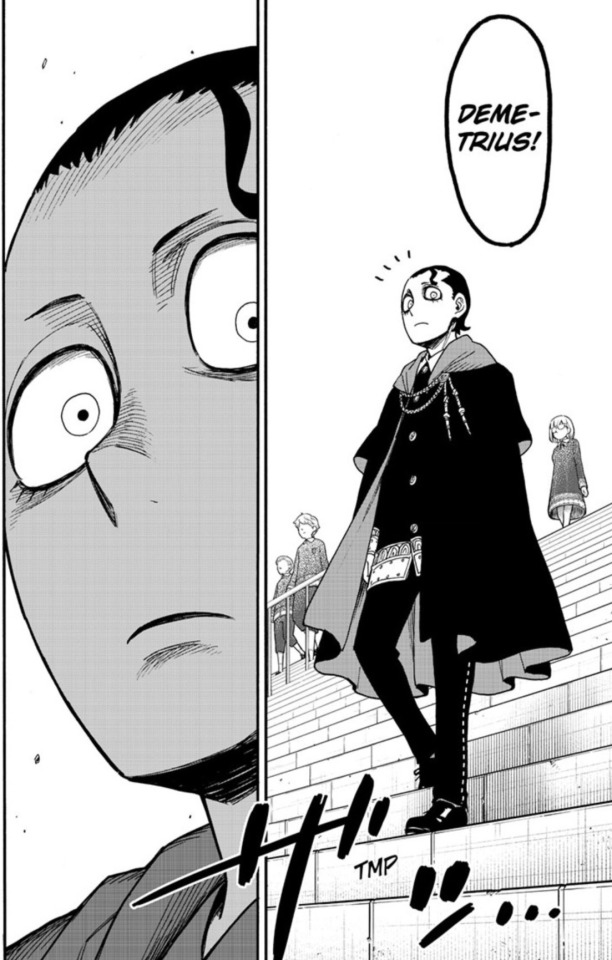
The unfocused look, very intimidating look, and eyebags under his eyes. Hell yeah, he got freaking 6 stellas and didn't even seem happy about it. He just looked very tired and just wanted to go to rest.
Damian and the rest of the gang approached him, and damian went to congratulate him of his achievement. But it seems that Demetrius looked very intimidating to him so he started to stutter. Demetrius took the lead of the conversation and asked him about his Stella (which indicates that Demetrius is actually looking at the progress Damian does academically, which is the most important aspect of demetrius's life). Normally when asked this type of question, it's normal to say "yeah how did you know?" "Yeah what do you think?". But not damian (my little child seems to struggle)😭, he instantly jumped into "how do you think father would think?" ,which is wrong in different aspects, firstly demetrius is the one who asked about his academics, so it felt very disrespectful to do that. Secondly , knowing how Damian gets annoyed with the girls in his class asking constantly about his father (and he's the second son with less remarkable achievements), I'm sure that Demetrius himself has even worse share in this experience, he doesn't even seem to have friends because he feels in different league, and people either intimidated by him or try to use him to get to his father. Lastly, it's their second time talking to each other in school, and damian still asked him in the same matter (about their father) which really gives an impression that he has nothing to ask about but this. But of course Damian didn't mean that, he's a little child who is trying to reach his family, Demetrius himself seems to have also problems with reaching out to others.
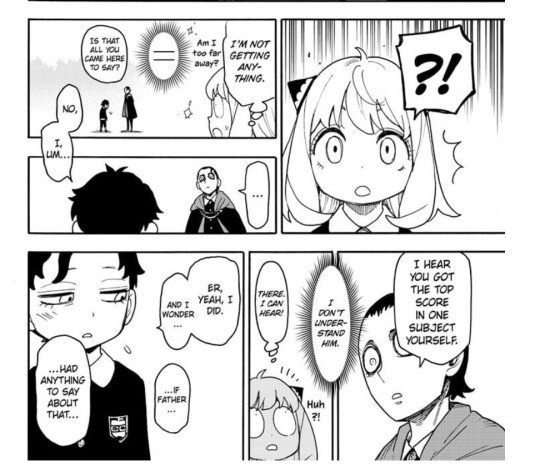
But even then he didn't get mad, even in his mind, he didn't get annoyed at damian, he just swayed away keeping his boundaries without any addition, something that neither Melinda nor Donovan did (imo he still got judged wildly). With one struggling with her emotions and splitting episodes, and deadbeat neglectful dad. Which made me believe that he is the one who has higher chances with having a stable relationship with damian. I talked more about this here but to summarise, demetrius is quite surprisingly patient with damian at most times. Considering their parents and his age too.
Now into his interesting mind, in chapter 93, anya tried reading his mind but got nothing at first, and the things she got was he (I don't understand) questions.
This hit very different seeing chapter 110, when Melinda said Donovan can read mind and even demetrius had been saying that.
A lot of people drew to the conclusion that Demetrius has this habit of blocking his mind since he knew his father can read mind, he restricted himself to not have any thoughts at all, which is very painful to think about, making your child anxious to this point is really a new low truly, donovan.
There had been questions about how this is even achievable, a state of blanked mind of barely any thoughts, Mr green talked a little about it when he was with damian and his friends. But let me explain this more.
What is demetrius doing is very similar to something called "dissociation", it's a state of complete stillness of thoughts, flowing through the stress, you can say it's like putting your mind in an autopilot mode. It's a coping mechanism many people do in response to stress and trauma, and its severity changes from one person to another.
Now it seems very peaceful coping mechanism, but it's a hell itself, it's like getting into a deep hole with, the more you get deeper, the more difficult it's to get out of it. The more time you spend doing it, the more it's hard to keep up with your life and tasks.
I'm pretty sure that if Demetrius had been doing it from a very young age, it means he definitely is having difficulty in keeping his thoughts flowing, and that he is not voluntary and completely controls his mind.
Now, what could happen if someone is dissociating excessively? It leads to many mental disorders and problems. The most insightful of them are (dissociative disorders). The three main disorders are (ranked with severity from lower to higher)
1-Depersonalization/ derealization disorder.
2-dissociative amnesia.
3- dissociative identity disorder (aka called multiple personality disorder in the past but the medical term changed)
Now I'm very sure with the amount of excessive dissociation demetrius expressed (and even indicate he started doing it very early). I'm sure he has derealization disorder, he's very out of touch with himself and feels very separated from his reality ,which is a perfect description of this disorder. I wouldn't be surprised if he had dissociative amnesia, like I wouldn't be surprised if he said he doesn't really remember having dinner with his family in chapter 106 (he really was out of touch and just eating his food, not giving care to the tension felt in that time).
(until now he didn't show any signs of being a system or having DID)
I'm sure he also has different mental struggles other than dissociation, but this one is the clearest one. Him and Melinda showed very clear signs of mental health struggles, I tried to analyse that, I hope that they both heal and get the help they need.
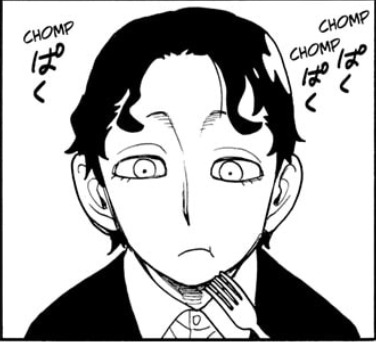
#demetrius desmond#spy x family#damian desmond#donovan desmond#melinda desmond#writing about this is very important to me as someone who struggles with dissociation and maldative dreaming myself#it's not very excessive like his but I felt very relatable to him#because he wasn't showing signs of distress people assumed he is fine... he is just “robotic”#which is not the case#sxf#spy x family manga
52 notes
·
View notes
Note
Which episodes have the best Dennis and Mac ship moments?
I wouldn't necessarily say Mac and Dennis have "ship moments" that you can pick and label as the "best" (other than what would make sense as scenes for compilations/edits?) and I'll defer to @psymachine's answer to a question similar to this: don't watch this show for Macdennis moments/episodes.
I can pretty confidently say that Mac and Dennis (and the show) will be lost on whomever decides to go at it through the lens of "best ship moments". Because what is considered a good "ship moment" for something as fucked as their relationship?
Mac is canonically admittedly in love with Dennis, so it's not hard to pull a ton of "ship moments" from his relentless pursuit: you have attempted kissing, erotic dreams, baby trapping, sex doll Dennis, room trapping...all stellar attempts on Mac's side and all important aspects for their relationship (Gets Romantic being one of my favourite episodes), but those moments are almost all, in the most blatant way to put it, sexual harassment. Sexual harassment of Dennis that was essentially born and grown from Dennis' conditioning of Mac's sex life in the seasons before: making and recording sex tapes for him, teaching him the best way to get sex is through carefully orchestrated systems and schemes made up of lies and deceit, that getting off has very little to do with a second (willing) participant.
Barring their individual personalities and mental illnesses, what ends up coming from Mac heavily relies on what comes from Dennis years before, and what is eventually ongoing between both of them (reaching batshit levels of sex chicken) exists among and within that all. IMO, placing any specific "best" on a moment for them as a ship is almost impossible without reference to everything before it (and an actual understanding of it all).
That being all said, what I would call the best ship moments for the two of them are what's hidden between and underneath the hard punches of their back and forth, the subtleties that are continually ongoing (mostly the ones that lead you to understand that Dennis is in it, even when Mac is on the offensive), this shit that's impossible to pin out of context:
The way Dennis gets even stupider when he's wrapped up in an idea with Mac (Timeshare, for example) and the way he attempts to cut off his outbursts when dealing with Mac's own stupidity (see Frank Retires) (and Recession is great for both of these). The fact that Dennis will push past his own grievances for little reason other than to make Mac happy (Suburbs) and the fact that at the end of it all, he's always going to end up going home with Mac (Divorced.. mm). (For all of this in one shot: Inflates)
And for Mac, in more recent events with Dennis on the offensive, when his ever desperate vie for Dennis' attention and affection is pushed back on in favour of being the Mac Dennis truly wants. The Mac Dennis fell in love with decades ago.
#iasip#macdennis#ask#today: 10 mins on extremely important work email vs 1 hour on casual tumblr ask about macdennis ship moments#guess which one ended up with a higher word count vs which one required 10x the brain power to answer#and which one has 23mm dollars on the line vs which one has *scratches head* some potential dopamine when oomfs hit the reblog button? ig#i hope eventually i can work my response here into some sort of blog post for the ppb#but macdennis.. its a dangerous game we play#and i worry a lot of people just are like. literally in it for the ship moments#in the classic sense of oh this would look so good in a compilation to convince my friend to watch this for gay people way#unfortunately i think if youre gay you should get into sunny the way god intended#the guy youre tryna fuck has it on tv when he invites you over at 2am#speaking of 2am that is the time so goodnight
70 notes
·
View notes
Text
HMMNGGGSHSHHSHD IM SO LATE TO THIS BUT THERES SO MANY THINGS IVE WANTED TO SAY FOR SO LONG AND IVE JUST BEEN TOO DEPRESSED OR BUSY TO DO IT
I did just re-read the chapter, hazbin/helluva hyperfixation is gone y’all I’m back and ready for more.
Okay so, a couple of things I noticed. Let’s start there.
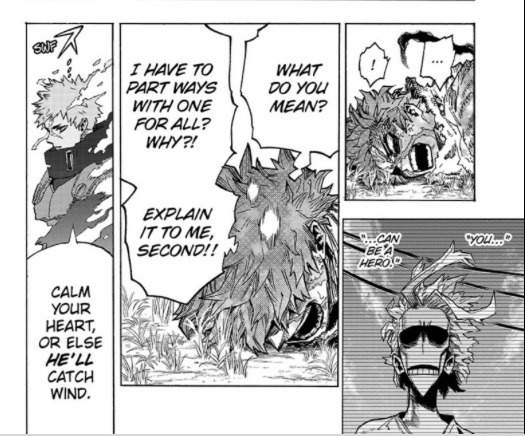
Throughout this chapter, it really is heartbreaking to see how Izuku regards one for all as Allmight’s power, and therefore a disrespect to him to give that away. Which is quite frankly insane given the nature of what the power is, but regardless it still shows me just how deeply he still cares for and admires allmight.
It also makes the transfer Izuku makes to Katsuki in the heroes rising movie all the more intimate; izuku wouldn’t just give the power to anyone, if not for himself (which is also clearly due to that fact since he still sees ofa as the thing that makes him a hero, not his characteristics), then simply out of respect for allmight and his legacy.
It’s just the anger you can see, feel in those words as he demands to know why. I’ve personally been in the boat of “Izuku dislikes Kudou immensely bc he hasn’t proven to be heroic and amazing like Katsuki has, and also he insults him a lot why would he like him”, since Izuku does genuinely have self respect (a common mischaracterization imo), he’s just also more forgiving and faithful to those he admires or loves (or both).
SPEAKING OF SELF RESPECT AND MISCHARACTERIZATION!
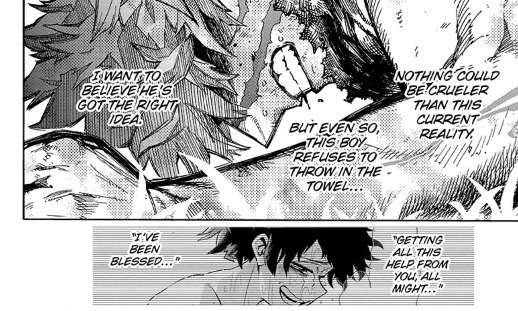
I want to highlight the words “But even so, this boy refuses to throw in the towel”, bc it’s such an important part of Izuku and his character.
He isn’t overly self sacrificial, he isn’t a masochist, he isn’t even a martyr—especially not a martyr.
Izuku is stubborn. That is not the same thing as wanting to constantly die for others; izuku is like Katsuki, he wants to fight for others. Giving up just simply isn’t in his morality.
And if “giving up” also includes letting someone die or failing to save someone out of his own negligence, that’s not because he wants to die.
I can’t explain how much the interpretation that Izuku wanting to die, even for others, is so fucking out of character. Izuku is stubborn, he’s stubborn in the way that he won’t just fall over and let the ground take him. Given the circumstances, Izuku would fight for his life just as he would fight for another.
THIS HAS BEEN THE CASE SINCE, I DONT KNOW, CHAPTER FUCKING ONE?
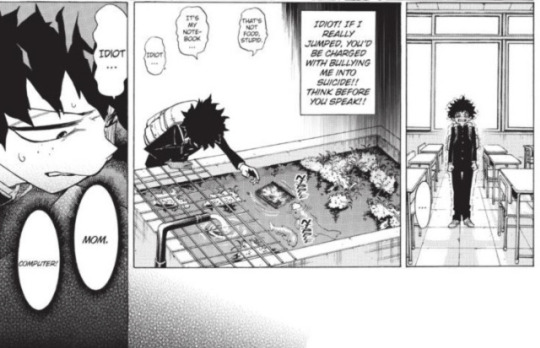
“Idiot! If I’d really jumped, you’d be charged with bullying me into suicide!! Think before you speak!!”
“Idiot…”
Like he’s so unaffected by the awful comment outside of being angry at the DISRESPECT of said comment. This is why all those damn suicidal Izuku fics have always felt so ooc. Izuku isnt a moody, brooding ball of depression, he’s a stubborn, courageous, and angry ball of depression. There is a difference.
Even before this, he literally attempts to say something or fight back to Katsuki, honestly it looks like he’s about to punch him here.
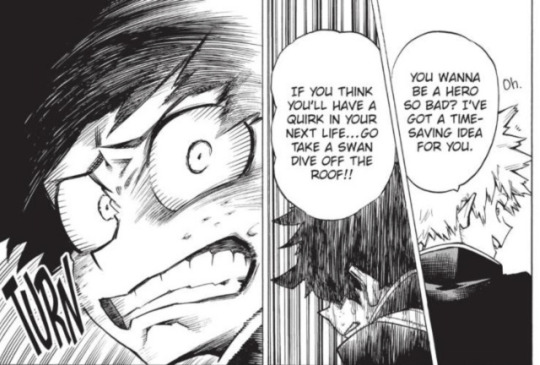
The only reason he DOESNT is bc HE DOESNT WANT TO GET HIS ASS BEAT
Btw for anyone who has or ever will be in Izuku’s position, punch him. I love Katsuki But hit him in the fucking gut. If you get your ass beat at least you can say you can took it like a champ.
Speaking from someone who regrets not punching three girls who were trying to gang up on me in middle school🫶🫶🫶
Anyway, I’d argue that Izuku not taking Katsuki in a fight was made out of self preservation, something he very much has.
And last but not least, we get to this lovely fucking page.
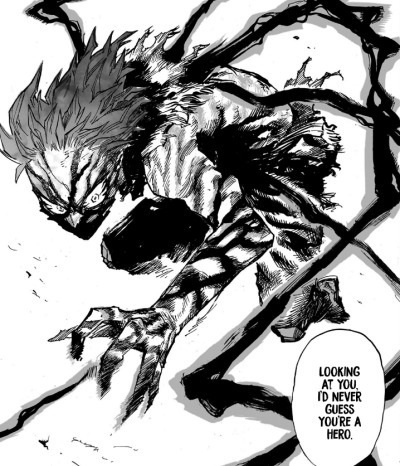
First of all…
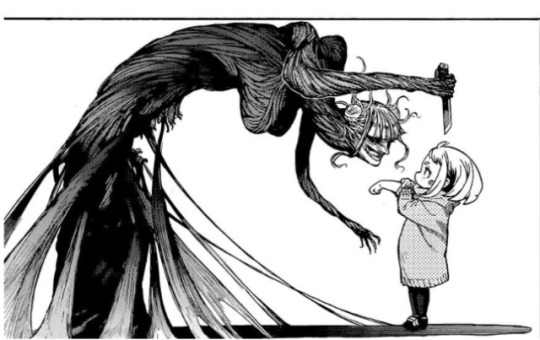
Hm, ain’t that strange?
I’m not saying it’s fully a parallel, I’m just saying it’s something to consider.
Especially with the context that I don’t think Izuku feels shameful here.
He’s been a hero who didn’t look like one once before, I’m sure a snide comment through Shigaraki is nothing in comparison to the literal hundreds of civilians afraid of him.
Or, even more interestingly, what if he’s shameful of it, and okay with that? Now THATS some control over your emotions. This is demonstrating the very thing Banjo told him in the first place; using his emotions to fuel him. Let himself live with them, breath with them. They exist, and they hurt, and that’s fucking okay.
But it begs the question…. Why bring attention to it?
Clearly horikoshi WANTS you to see that Izuku is the one who looks like the monster now. He even looks devil like, blackwhip coming out of his back the way it is just feels like wings.
But maybe… maybe this is how he stops sweeping problems under the rug. Maybe this is him, Izuku, at his most animalistic form. Him. At his core. This is the Izuku he doesn’t want people to know.
The faceless, long clawed, oozing black monster.
He’s a kid who can take a fucking beating. He’s not Deku the useless doll, nor is he Deku the hero. He’s simply Izuku.
And you know what’s even more likely?
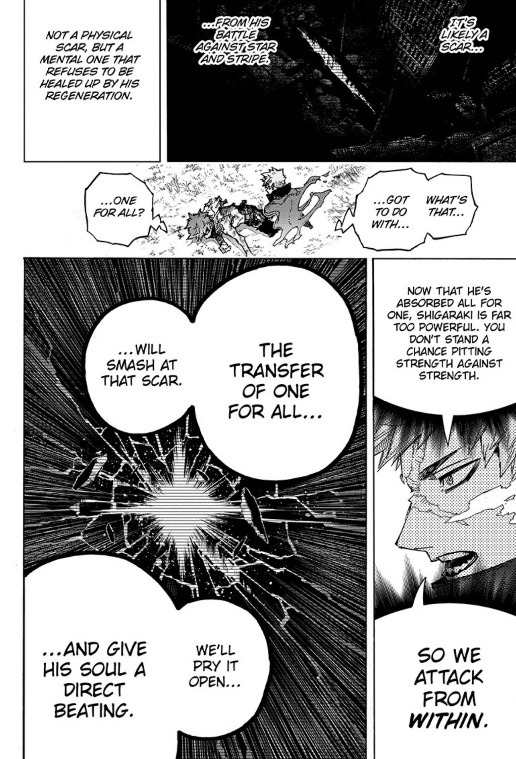
The black pit of anger that Shigaraki has formed, fueling his uncontrolled emotions and anger and despair, with the light tear showing something underneath…
What if, this was Izuku’s black ball of anger and shame, except this one is escaping his body, pouring out and showing all of that for what it truly is. Pent up rage, uncontrolled emotion, anxiety and shame, all mixed into one hell hole of a person—but a ball that can be molded, controlled, torn apart from the inside out.
See, the same way Kudou tears at Shigaraki’s mental breaking to see what’s underneath, so have the ofa users for Izuku. Slowly, but surely, the people in Izuku’s life have, while created that ball in the first place, also worked to destroy it. The final piece of the puzzle is for Izuku to choose to let it happen, and he is.
Learning to sit in one’s fear, doubt, hatred, anger, sadness, grief, happiness—without that emotion having to be something, simply something that flows through you, that you can choose to act on or not; this is where Izuku’s arc is coming to its tipping point. We are nearing the climax, I can feel it.
#bkdk#midoriya izuku#mha deku#bkdk brainrot#bakudeku#bnha deku#bakugou katsuki#mha analysis#deku midoriya#IM FUCKING BAXK BITCHES#I’ve been trying to write this for. not joking. two weeks.#like I have three different versions of this meta that I scrapped completely#they all have their own cool ideas tho so maybe I’ll come back to those#have a good fucking night and happy Valentine’s Day!!!!!!!
195 notes
·
View notes
Text
The next arcane-related/LoL shows i would love to see, why, and ranked in the order of which I think are most likely to get made
Because why not
Mel as Noxus leader: She was raised in this culture but it is also radically different than the one she's lived in for about a decade. I would love to see her getting harsher to be able to rule and also find room for mercy and peace where ever she can. Also she needs to fight the Black Rose and it would be amazing to see how she deals with the complicated emotions and sorrows that comes with her mom's death and the role both she and the Black Rose played in that. This seems like the most likely show to happen (it was basically confirmed when we saw she went home and I'd be pretty disappointed if we never got to see what happened after)
CaitVi meeting Jinx again: they leave piltover to fight battles in other distant lands (I know nothing of LoL lore btw) and find jinx living a better life. If this was my show to write, years would have passed at this point, and both jinx and Vi are doing great. Piltover is Vi's home and her and cait are stronger together than ever. Jinx has settled in a new town and isn't causing trouble. This would force Vi to realise that she can't do anything but let jinx go for real (by choice) and trust that she will be okay, even if it is difficult. She can't bring jinx home because piltover isn't jinx's home anymore, and she can't leave piltover behind since that's where her whole life is. They could bond and promise to meet again, but in the end vi would have to choose her own happiness and leave jinx where she can't protect her. I'm not sure how likely this is to happen. I don't think we've seen the last of vi or Jinx, but not sure if they will have separate stories or if this is anywhere near how it would go (probably not)
JayVic starting a new life: don't have many ideas for anything specific, just that they might have survived and teleported to somewhere else. The arcane would have left them, and the story could be about grief and love as Victor might have his disease again, and both of them have lost so much. But if they have a community where they are, then it could also be about the importance of external support and help. For the sake of action ofc, the science bros would have to save people from some great threat and preserve their new lives. Unlikely to happen imo. It felt to me like the show considers them dead even if they could have survived. But one can hope.
Ambessa origin story: personally what I want the most, but probably the least likely to happen. How did Ambessa come to power? who did she fight? how did she become who she was in the show. I wanna see War and fighting and death. Sadly, it's not going to happen. "Blood sweat and tears" was basically an origin story speedrun. But ambessa is my favourite character (maybe, im pretty indecisive), and I will always want to see more of her.
Bonus idea: basically a slightly more possible version of the above one, but mixed with Mel's story. One where we focus mainly on Mel ruling noxus and fighting the Rose but where we also get flashback scenes (or even whole episodes!) that focus on Ambessa. The scenes (or episodes) could be triggered by Mel having to make a choice that her mom also had to make once or through her learning a secret about her mom, and then we learn the context through flashbacks. It's not impossible that a future show could do that... Please... I need more Ambessa
#ofc i have no idea but these just seemed like places with obvious potential#i wrote this quickly so if its all nonsense thats why#i also have no idea what is officially in development n stuff#arcane#arcane season 2#vi arcane#vi and jinx#vi and caitlyn#jinx#jayvik#jayce talis#viktor arcane#mel arcane#mel merdada#ambessa medarda
38 notes
·
View notes
Text
i know i'm late to the party and most of these points have probably been touched on already, but i said i would make a post about why kant safewording in episode 8 was so impactful and i am nothing if not a man of my word so here we are
(under the cut bc this got completely out of hand)
tbh i feel like i could write 10,000 words and i still wouldn't be able to fully articulate the way it completely turned me inside out when i first watched the ep, but i still wanted to pull this scene apart anyway bc as i said at the time, there were (and perhaps still are) people who think kant safewording in that moment was silly or out of place or whatever, and so for my own sanity i need to list all the reasons it was not only not stupid, but actually incredibly powerful for both kant and bison's characters and their relationship overall
bc think about the context. think about how shy bison had been when he had introduced the idea of a bdsm dynamic to kant, how he had admitted it's something he had wanted for a long time but never had the opportunity to actually have that with anyone. think about how reluctant he had been to actually hurt kant, and how enthusiastic and happy he was when kant told him he was into it too. how careful he was with kant, how thorough he was about consent (excluding the scene in his bedroom obv, considering he was drugged and couldn't consent nor dom properly). how insistent he was that they have a safeword despite kant's dismissiveness bc he knows how important it is that they're safe, and that they trust each other completely. to have it and to use it.
and then think about how gutting it must have been thinking about all of that in the context of a lie. a complete farce. this thing that bison wanted so badly, a thing he was so happy to finally have w someone, to trust someone with that part of him after a lifetime of keeping it inside. think about how vulnerable and exposed bison must have felt in the wake of that realisation, esp considering he doesn't have really any experience actually domming someone fr. how used he must have felt, knowing that this really deep and personal desire had been used as nothing more than a tool to manipulate you by someone you thought you were developing a genuine bond with. kant betraying bison is one thing - imo, it was the sheer depths that kant had seemingly gone to just to use him that was what really hurt bison (which in turn made him angry). like think abt it from bison's pov: why would kant make a point to project the northern lights all over the walls for him, sit and make all these plans together so that bison's dream come true? and why the hell would he go so far as to let bison dom him when bison had tried so hard to basically talk him out of it? that's not just betrayal. it's sadistic and it's cruel. it's like kant didn't just want bison arrested, but also to break him from within.
so that's the context. keep all of that in mind. and then think about kant, tied down, completely at bison's mercy. following bison's every instruction. taking all his abuse. and then think about him safewording. he could have said anything, could have done anything. but he chose to safeword. why? why that word? why right then?
well. the use of a safeword is obvious right? it's someone's way of telling their partner 'that's enough, i don't like this anymore'. and that is the very surface level of what kant was saying by safewording. but obv the context is very, very different here. and i think it goes back to the conversation that they had when they agreed on the safeword in ep 3: kant doesn't understand then the importance of what a safeword is and what it represents. he thinks he can just tell bison to stop and that he will, and bison is obviously like 'well no, that's not how it works'. he basically says to him 'how am i supposed to know you're not still enjoying it? how will i know you actually want me to stop? what if i get confused and hurt you more?' and kant says he gets it, and to a degree he obviously does, but i don't think he got the depth of what a safeword represented until it was tumbling out of his mouth on that beach.
bc as i said, a safeword is about trust. it's about two people (or more! but we're just talking abt these 2 rn) trusting the other that if this word is said, then everything stops. no ifs ands or buts. the sub obviously has to trust that the dom will stop if they safeword, but it's just as important that the dom trusts that the sub will safeword if they're unhappy with whatever's going on. the dom has to trust that the sub trusts them.
and so kant safewords. and yes he's saying 'i don't like this anymore, i want to stop'. but he's also saying 'i paid attention, i listened, i remembered. i know you meant it and i meant it too. what you told me was important to me. i value what is important to you. i didn't just dismiss it, i didn't just dismiss you. this was never just a tool. it was never fake to me. i never used this against you. i really am telling you the truth and here's the proof.' (which, for the record, is also what he was saying before the safeword when he was like 'i know you've never trusted anyone before, i still haven't forgotten our plans, i still want to go to iceland together' - it's all reassurance that he hasn't forgotten and that it wasn't fake, that he meant all of it and it's all important to him too). and he's also - maybe even more importantly - saying 'i trust you. i trust you to stop because i'm telling you stop. if you will listen to nothing else i say, i trust you to listen to this. i'm trusting you because this is important to you, and it's important to me. i trust you to keep me safe. i trust that that if i say this word, you won't hurt me anymore.'
which is exactly why one of the first things bison says to kant afterwards on the beach is 'you think i can't kill you, don't you?' because he knows. he knows exactly what kant using that word meant, what he was saying. it's why he froze, why he was so thoroughly devastated, why he briefly lost his shit then completely fell apart afterwards - because even though it was just one word, he heard everything behind that word, and what was underpinning all of it, which was basically kant saying this isn't over for me yet. i'm still in this relationship with you. i'm still yours and you're still mine. i still trust you. and though you might not trust me right now, i know you'll trust this.
(and that's also why he repeats it so many times imo. by saying it over and over, he's proving that it isn't just a desperate or panicked plea to get himself out of that situation - he says it again and again, making a point to look bison right in the eye each time, bc that's acknowledgement that he's well aware of what he's doing and saying by using their safeword, and he wants bison to know that too: this isn't an accident, this isn't a mistake, this isn't a last ditch effort to live. i'm saying this on purpose, because i know what it means for you and me both.)
which yeah, is kind of a kick in the guts if you're bison. he knew he couldn't hurt kant. he knew he wasn't angry the way he was pretending to be angry, because the hurt was just too visceral (which i'll expound on in a second). and here was kant basically sticking his fingers in a fresh wound. here was this man he shouldn't trust at all, telling bison that despite who bison was and after all things bison had done to him (deserved or not is irrelevant here), he still loves him - not just with words but proving it in a very tangible way. a way that was theirs and theirs alone.
that was what gutted me on my initial watch. i obviously didn't think about all of it consciously in that moment, but i still knew it was there. i still felt it, the same way bison did. kant safewording in that moment was never just about him saying 'stop, i don't like this, please stop hurting me' and bison knew it, which is why he reacted so strongly to it (and why i did too lmfao)
so that was my initial thoughts, but liz @ropebunnykant brought up a really interesting point that i hadn't considered at first which is that kant was also safewording for bison's sake. which, while it hadn't been my first thought, definitely wasn't the first time i've heard of something like that happening either - a sub safewording, not bc they necessarily need to, but bc they've noticed that their dom isn't enjoying it/isn't in the right headspace to continue etc. and when i went back i could see it so clearly, esp as kant started to repeat it.
bc what happens immediately before the safeword use? kant pushes, and bison says shut up. kant continues pushing, and bison keeps telling him to shut up. the back and forth of bison and kant's safeword discussion is once again so important to the context here - kant asking if he can just say bison's name to stop him, and bison telling him no, that they need a way to differentiate when 'stop' is just a word and when it's genuinely meant.
bison telling kant to shut up was his stop. and kant pushed, because he didn't realise it straight away, because he had so much to say and for the first time bison was listening, because sometimes stop doesn't mean stop. but at some point kant realised that this stop did. and what did bison teach him to do when he really needs to stop?
and so kant safewords.
i do think kant could have kept playing that game for as long as he needed to. as long as bison was angry, kant would have stayed chained up like a dog. he didn't have to - he proved he could easily get out of his restraints in their very next scene. he could have asked the caretaker to help him get away. but he didn't. he chose to stay. maybe he wasn't on the boat, but at that point kant was a willing participant in what was happening, he was consenting. why? bc kant deserved punishment. bc bison deserves to punish him. bc to him staying there is it's own kind of proof. bc if bison's angry then he's still talking, and if he's talking there's hope. apathy is what was going to kill kant and he knew it - if bison's angry, that means he still cares.
but then we get that shot of kant's pov, of bison staring down w the gun pointed at him, barrel shaking, tears in his eyes. and it's not fun anymore. neither of them are gaining anything from this. bison's anger has finally given way to hurt, to heartbreak - kant knows in that moment that bison isn't getting any kind of satisfaction out of making kant squirm, and likely never was. which literally goes back to the core of a dom/sub relationship, doesn't it? you engage in that kind of dynamic bc both parties are getting something out of it. kant was getting the flagellation he thought he deserved after what he'd done to bison, the punishment he wanted (and to a degree needed) as payment for his wrongdoing and the sense of absolution that provided him. bison got the satisfaction of providing that punishment, of letting out that anger, of making kant hurt for what he did - or so kant thought. bc the reality is that bison wasn't getting any satisfaction out of punishing kant. no matter what he said or did, no matter how he hurt or degraded him, none of it made him feel better. and kant hadn't noticed that until that moment (which i think he can be forgiven for, given everything that he was going through). but then he does notice.
bison wasn't getting anything out of the hurt he was inflicting, and was inflicting pain upon himself in the process. and if one of them is not getting anything out of it - if one of them is actively hurting themselves in a way that doesn't feel good - then they need to stop. someone needs to safeword. kant knows this. and so he safewords - not so bison doesn't kill him, as some people have said, but to stop bison from hurting himself any further.
and so kant safewords immediately. retracts the consent that perhaps bison hadn't even realise he'd given willingly. he ends the game. he uses his safeword just like bison taught him to, bc it matters and he trusts him and he loves him. that hasn't changed, not even like this. and he repeats it so many times for that very reason.
and believe it or not, i feel like there is still so much more to it i could pick apart even beyond this. bc god there are just so many layers!!!! like there's fear in it too, bc as much as kant is unconcerned abt the gun and is sure that bison won't hurt him, he's still human. some degree of fear is normal. i also think kant sensed an opening in bison's defenses that he wanted to get at just so that bison would just listen to him - bison wasn't really in the headspace to listen to anything before then, which is exactly why kant hadn't really tried to explain himself properly. it would've been pointless. and as much as he loves bison, kant is still kant - he still knows how to work people. i also think kant was tired and hungry and emotionally exhausted and while i do think he would've played along for as long as he had to, i think he also needed bison's anger and attention to fuel him. faced w nothing but his sadness, he lost all steam. kant's own sadness and overall feeling shitty probably hit him full force in that moment too, and he didn't have the strength not to fold under it. and so he safeworded.
however, if i start picking apart all of that i really will end up writing 10,000 words and no one really wants that, least of all me. but the point that i really want to make is that kant safewording in that moment was never really abt him not wanting to die. it was about care and it was about trust. it was about acknowledgement. most of all it was about love. and we'd all be doing the story and these characters a disservice to simply go 'hehe he safeworded out of murder' while not also addressing what it really was! which was kant acknowledging their bond, showing bison care in the only way he could while telling him he loves and trusts him all at once!! it was him claiming ownership of the ownership bison has of him!! he said penguin bc there was literally nothing else he could have possibly said in that moment that would have had the depth and significance than that one little word did!!! he said more with that one word than he could have said with a thousand other ones!!! and it drives me crazy whenever i think about it for more than 5 seconds at a time!!! thank u for coming to my ted talk!!
#the heart killers#kantbison#thk meta#jesus christ im so sorry abt this good lord#it just. meant so much.#perhaps im biased but to me it was kant metaphorically putting a collar on himself and going#'you're mine just as much as i'm yours and nothing you have done to me or anyone else has changed that and it never will'#and one thing about me. i love possessiveness.#anyway my point is that kant safewording meant so fucking much for both of their characters AND their relationship#which is why everything changed afterwards. it literally broke thru bison's hurt and anger BECAUSE of what everything it encapsulated.#which is powerful no matter which way you cut it
36 notes
·
View notes
Note
Hey.
I constantly argue back and forth with TB stans that Jace, Luke and Joffrey aren't legitimised just because Laenor, Corlys and Viserys go along with Rhaenyra’s lie about them being "trueborn". As I'm sure you're aware, in Westeros only a king can legitimise the illegitimate by first declaring their bastardy and then legitimising them afterwards. And TB stans. Just. Don't. Get. It. They also seem to think that the King's word is law in Westeros. They don't understand that this a feudal monarchy where the king and his vassals are reliant upon each other and both must respect the social contract in order for the Westerosi social structures e.g. monarchy to be maintained.
IMO, they fall for the narrative trap of the Targaryen characters. Just because Viserys and Rhaenyra say that the King's word is law doesn't actually make it law. It's only law as long as the king has the ability to enforce it. Therefore, if a king did something insane in the eyes of his noble polity, e.g., try to place his bastards in the line of succession, they'd rebel proving accurately that the King's word is in fact not actually law. Aerys's overthrowing is a great example of this. As is the reign of Daeron II: if his word was law and everyone had to obey him, no one would have joined Daemon Blackfyre's rebellion.
Anyway back to TB stans. I think alot of them don't actually realise how the world works. Even GRRM confirmed the bastardy of Rhaenyra’s 3 son's for goodness sake. Every time they try to deny it using the aforementioned argument it only confuses me. Are they insecure about Rhaenyra having illegitimate children? Is that how far they're para-social relationship with her goes?
They also have another stupid argument that Rhaenyra's kids having her blood means that they can inherit her throne. No no no no no no no no no. THAT'S NOT HOW IT WORKS TB. If it was Westerosi lords with bastard relatives, it would allow them to inherit. You have to be trueborn. It's unfair but these unfair laws are what keeps Westeros from constant civil war. That's the point of inheritance law in the Seven Kingdoms.
Anyway, sorry about the rant. It's just that sometimes when I argue with certain TB stans they don't seem to understand the laws of the world they're fans of. They will bend over backwards to excuse their faves, not understanding that you are allowed to criticise a character you like (& in their case love). I think Rhaenyra is an interesting character - moreso in the book TBH - I just don't get why so many TB stans willfully refuse to understand the way in which the laws of the world she inhabits work. Any thoughts?
Hi anon, it took me forever to get to your ask but you're right! 💚
Not all TB stans share the same views, and there are people in here with whom you can converse intelligently, but I have also seen the discourse you're referring to, and it is very annoying when the stans don't get it.
You put the Westerosi legitimization process very well. If we consider the greater Middle Ages-inspired world-building context that Westeros is based on, it makes sense why bastardy is a stigmatized social issue. Blood "purity," lineage, and legitimacy are important because they are the only way land and titles are bequeathed and inherited.
The King is the only one who can legitimize his own illegitimate children as heirs, but he can do so for other illegitimate children, regardless of whether these are related to him by blood. King Louis IV, for example, legitimized John II Duke of Brabant's son, Jan Cordeken, after a petition John wrote to him thus enabling him to inherit his father's fortune and found the House of Glymes. From Ancient Egypt, Greece, and Rome to Enlightenment Europe, there are examples of Kings legitimizing not only their children but also the children of their officials, courtiers, and friends. It was seen as granting a favor to them, and when it came to personal matters, a King might choose to legitimize his children when he ran out of heirs, or in the case of Louis XIV, because he could and wanted to.
In other words, Viserys, who knew of but chose to ignore Rhaenyra's sons' (his grandsons') bastardy, had ample time and opportunity to legitimize them but chose to blind himself to the truth instead. What was that about Alicent calling Viserys "weak" in one of the deleted scenes of S1? Well, "weak" isn't the only word I would use to describe him... also irresponsible, foolish, and inadequate.
Nevertheless, the legitimization process in history was seldom favored by the court, the King's vassals, and the people, and caused quite a stir. As you say, the King's law didn't hold up that much ground compared to the law of tradition and at times the Church. The people didn't care if a King legitimized a child by naming them heir... the stigma of being born "illegitimate" wasn't washed off that easily, because bastards were seen as devilish, impure, half-breeds, unnatural hybrids, and so forth. So Viserys choosing to ignore the issue face front was bound to be catastrophic, because no matter how he tried to silence the tongues that wagged by threatening to cut them off, the issue of his grandsons' apparent bastardy remained, and THE REALM would not accept any of them on the Iron Throne, for the same reasons.
And Viserys did nothing about it. He could have confronted Rhaenyra when Jace was born and reminded her of the stark reality of the consequences of what she was doing. Not only did he name Rhaenyra (a woman) as his heir, which alone was controversial and unprecedented, but a woman with three illegitimate children, whose existence never even tried to correct or prevent. Viserys alone weakened Rhaenyra's claim with his lack of foresight and counsel.
If TB uphold the "Viserys loved his grandsons and he accepted them as they were" narrative, they are not only deluded but lack media literacy as well, because Viserys DIDN'T CARE if his grandsons were trueborn or not, or if that would plunge the realm to war, the same way he didn't care that he had named Rhaenyra as his successor when the realm, who was so used to having Kings for centuries, knew he had THREE legitimate sons of his own.
So my two cents on the discourse would basically be that those who don't understand the social and political repercussions of Rhaenyra having bastards, not being counseled as to why this is destructive, left on her own to raise them, and having to cope with the consequences of her actions as she realizes that the father she so loved and admired didn't protect or support her at all, are missing out on a much more interesting character in Rhaenyra and a more complex dynamic with her sons, who she now understands are exceptionally vulnerable and potentially threatening to her cause.
This is a far more intriguing reading than anything TB stans are getting at with their "no criticism" ban on Viserys and Rhaenyra.
#this turned out to be an anti viserys post and I think it was about time#thanks for the ask!#dracarys on viserys#anti viserys i targaryen#anti tb stans#hotd#house of the dragon#hotd season 2#hotd s2#team green#the greens#house of the dragon season 2#hotd meta#hotd discourse#greenqueenasks#greenqueenhightower
58 notes
·
View notes
Note
I was wondering if it’s possible that many romantic/friendly relationships with women (whether involving Philip or Alexander) were not recorded in our sources because they were not politically significant. Could it be that both had such relationships that we are simply unaware of? The erasure of women in history is a recurring issue, and I wonder if this is why we tend to think that women were completely excluded from the social life of the time, and that relationships between male companions were considered more worthy of mention by earlier sources. Sorry for the long question!
Women in the Life of Philip and Alexander (and other ancient Greek men)
This is an excellent question, and one that shows good attention to how our ancient sources work. The short answer to your question is, “Absolutely,” and “Almost certainly.” Several scholars of women’s (Greek) history have noted that women traditionally would have operated at home (their sphere) and thus, out of the public eye. But we’d all be fools if we didn’t assume mothers and wives and sisters and even daughters didn’t have an impact on men.
However patriarchal a society, and however terrible the oppression of the women in it, the simple truth (imo) is that more men are decent human beings than not. It’s just that the ones who aren’t suck all the air out of the room. That’s hardly to say systemic oppression is “okay” because some men, maybe even the majority of them, don’t beat their wives even when they’re legally allowed to. Yet I think it’s still an important point to make, because it allows women in history to get out from under the “victim” label.*
One of the points I make in my history classes is that there’s a huge difference between women’s legal rights and female AGENCY. So, deeply patriarchal societies such as ancient Athens and Macedon can produce an Aspasia and an Olympias. Or Han China can produce a Lü Zhi. But for each one of them who land in our history books (even if villainized by the male historians), a hundred more quietly manage their families from the shadows. (Below: funeral stele of Theano, c. 400 BCE; while reading multi-figured grave stele is not an exact science, she's probably the deceased figure, and her husband (Ktesilaos) made it for her, although it could possibly be for them both.)

So, the longer answer is that the presence of such women in the lives of public men depends (as always) on context. E.g., what venues allowed women to be present (to influence men), and which did not. Ergo, we must ask where the women are, and are allowed to be, in order to get a grasp of which women would be doing the influencing. In Greek (and Macedonian) politics “at home,” women are everywhere, albeit they may not be permitted to speak in PUBLIC spaces. Or at least, their public-facing actions are limited, usually to acts of eurgetism, which in turn is limited to elite women (with money). (Eurgetism = public donations.) But these women may have a great deal of influence at home.
Aristophanes’s play, Lysistrata, gets at this in a humorous way. The women go on a sex strike until their husbands agree to end the (Peloponnesian) war. It doesn’t work because the women wind up wanting sex just as much as the men, so they can’t keep their own resolve. It’s funny in an upside-down way not only for the raunchy subject matter, but because Aristophanes does give women a lot more agency—and foibles—than they’re often allowed in literature. The very fact the women have trouble sticking to their decisions echoes their husband’s inability to get out of a war that’s destroying them. Even though Aristophanes was conservative politically (we think), it’s a surprisingly sympathetic (to women) play. And it makes me suspect that he had a strong woman at home. He did have three sons (all later Middle Comedy authors although none in their dad’s class), so he obviously had a wife.
Women had their own means of influencing events around them, which weren’t always visible. Yet their capacity for influence depended on the willingness of their men to listen.
In venues more purely male space, such as warfare, the presence, and influence, of women would have been curtailed. Yes, there were certainly women in a military camp, but many fewer, and they were mostly in low positions: slaves and prostitutes, not wives and mothers and sisters. Men who might respect their mothers were conditioned not to respect or listen to slaves, even if they didn’t abuse them—and assuming they could even understand them. Most would have been prisoners of war who didn’t necessarily speak the language of their captors.
Furthermore, the brutality of war leads to bifurcation in mental space, and Greek men were already conditioned even at home, never mind on campaign, to assign women to one of two categories: protected/“our”/family women, and unprotected/slave/prostitute women. Just as we, as a species, tend to create “pet” animals and “food” animals, and are unwilling to eat animals we regard as pets, may even spend thousands of dollars on their care and cry bitterly at their loss. War only exaggerated a pre-existing tendency.
Ergo, it’s not that ancient Greek and Macedonian men couldn’t regard women as romantic partners and even friends, but whether female candidates for that position were available where they are. Particularly if where they are is on campaign.
Beth Carney has a chapter on women in warfare in the new Brill's Companion to the Campaigns of Philip II and Alexander the Great, if you can lay hands on it. :-)
On that note, I’ll say watch what I do going forward in Dancing with the Lion, and how I handle figures such as Kampaspe, Kleopatra, Barsine, and Sisygambus (et al.). Or for that matter, how especially Kampaspe and Kleopatra function in Dancing, particularly with regard to Hephaistion.
--------------
* And some women can be just as cruel. When we assume all women are innocent victims, we also fail to recognize female agency, which can include cruelty. We must act for fairness because it’s fair, not because of pity, or because the ones oppressed “deserve” salvation.
#asks#women in ancient Greece#women in ancient Macedonia#Alexander the Great#Philip of Macedon#women's agency in antiquity#influence of ancient Greek women on their men#women and ancient warfare#women as prisoners of war#Classics#ancient Greek wives and husbands#Lysistrata
31 notes
·
View notes
Note
what would you consider essential marc and rosquez watching? i don’t mean races but the stuff happening around it, there seems to be so much and idk where to start 😭
BIG ass question. i think it depends what you want outta this and how you best interact with content slash consume information. for me (not to brag but. winner of multiple historical essay writing competitions in high school. for context on the kind of freak i am bringing to the table here.) the research is kind of the fun part ! like i just started googling shit! i would go to inactive blogs and just search 'marquez' on them to see what would happen ! a lot of the times that works ! but it also takes a lotttt of time lol so i'll chuck some good resources your way, why not...
okay im not sure how basic we're talkin here but um. background. so the documentaries are, i think. the best place to start. theyre entertaining and offer a good amalgamation of clips to provide context for the actual racing. and like i know you de-emphasized racing (which is fine lol who cares) but it really is like the most important thing in the world to these fools and its a pretty visual sport so i think its at least helpful. like yes sepang IS about the press conference, but its also about the conversation they have ON the race track using their motorcycles. which is also somewhat a conversation that they HAVE been having all year long...
i'd start with hitting the apex (2013), its a GREAT introduction to the "characters" that does a lot of legwork to contextualize everything. lays the scene for where vale is at coming into his relationship with marc (both personally, wrt to marco simoncelli, and career-wise concerning his flop at ducati), and also how insane marc's whole deal is in general. the second half is. materially a study on what him entering the premiere class did to the sport as a whole. the introductory chapter in many respects
marc marquez: all in. MY introduction and blissfully free online. marc comma in his own words, with all the implications of that. a self-produced documentary where he is giving feedback about the edit of said documentary straight to camera and no less vulnerable because of it which is very marc imo. revealing both intentionally AND unintentionally about his whole deal with injury, vale, and his image.
motogp unlimited. im gonna be real kind of boring. like i would still watch it ! but do it kind of later, once you know the major players so youre automatically more invested. it doesnt really give you more than marc says himself in all in tbh, and i get the sense him and vale were NAWWWT interested in doing more than the bare minimum for it.
marc's rookie doc. free and subtitled on the youtubes. the first half of this is deadass just him wanting to fuck vale so bad while every comment from vale has me saying GIRL. out loud because the foreshadowing would be genuinely shocking if this was fiction. anyways the laguna seca of it all....
next i would hit up PODCASTS ! i think it makes sense after the documentaries, because these are all podcasts that arent strictly about rosquez (even if they are in many ways the main characters lmao) and personally it helps to put faces to lesser known names that might pop up before i listen to a purely audio product and get lost in the soup of sounds. the paddock pass podcast has two retrospective episodes about the 2015 season that are really good at context, oxley bom pod has a fun recent episode on valentino that i love, again just poke around a lil
videos. these guys have never filmed a lot of content together tragically. what i wouldnt give for someone to make them do an escape room. anyways ranch visit HERE (post explaining the ranch visit here). sepang presscon (sowwy) here. vale unhinged podcast interview the month after marc's documentary came out here. vale retirement interview where he gets asked about marc here. vale talking about asking marc to the ranch here. vale postrace at argentina 2018 here. UCCIO postrace at argentina 2018 here. theres a lot moreeeee just go on my blog archive and filter for rosquez and vids its easier lol
journalism. hello. okay so you should genuinely spend some time reading through mat oxley's stuff he can write (theres a paywall but you can run that shit through wayback machine). he also loves an insane comparison which i do enjoy.... again this is one that can be solved by googling his name and tacking on 'marquez' or 'rossi' or a specific time period or race it will probably reap some dividends. in terms of specific ass articles this one is kind of load bearing in terms of sepang and some of the interpersonal competitive tensions at play. that being said there are manyyyyyy crazy interviews and snippents of articles from other journos floating around motogp tumblr (like literally too many to link) adn its fun to dig around to find them, but mat oxley gets a shoutout because i was reading this article TODAY !
other content. honestly one of the best resources I'VE found for plotting out the arc of their relationship is @kingofthering's everyrosquezpodium series. you can REALLY see it play out lol. also her tagging system rules she very neatly lays out years and races... so if something jumps out at you, CLICK ITTTT ! also all of @ricciardoes fave presscon moments series. insane.
all this to say a small little rpf fandom like this rewards some digging! i would just recommend following narrative threads that interest you ! its also a small fanbase that is pretty research oriented, so if youre ever confused about somethin, just shoot an ask or run a search on someone's blog (@kwisatzworld has endless vale resources and @batsplat is one of the most thorough researchers ive ever seen, for example) like for real theres so much... i also have a primer that i made forever ago that has some links on it so you can peruse that if you so wish. but frankly a lot of it is just using those research muscles and being sufficiently deranged enough to be screenshotting reddit threads at one am so you can post them to tumblr because they mentioned marc and vale in the same sentence and that lit up some of the neurons in your brain
(and i know you said outside of races but i think theyre good benchmarks as turning points soooo you should do some diggin on laguna seca 2013, jerez 2015, argentina 2015, ASSEN 2015, sepang 2015 obvi, argentina 2018, and misano 2019. those are the big tentpoles of insane rosquez relationship drama imo. i mean theres many more but. im limiting myself.)
#i also. found stuff bc i did a lot of digging around in blogs archives from 2013-2015. but this was because i was unemployed#and my migraines made reading books (my FAVORITE THINGGG) kinda hard for like 6 months#so i was acting like a border collie that hadnt been walked in two weeks but like. mentally. and we got here.#tumblr didnt hurt my head so much NOOOO idea why#motogp#callie speaks#asks#rosquez
94 notes
·
View notes
Note
I'm always a big proponent for localizing when necessary so I'm interested to hear your takes. For example, I'd much rather remove things like "senpai" or honorifics. If necessary, fully localize to the setting all the way down to the location (ex: Because Ace Attorney is a game that so heavily focuses on modern day Japan's legal system, there's the chance that could put off American players from buying the game for fear of being lost due to the differences in the systems, even though the game itself has no such issue. So localize to LA to break through that initial barrier and get the player to pick up the game). If not, keep the location (MOST stories don't need their location changed) and explain that which needs explaining, but fully translate all dialogue and speech patterns (I actually approve of P4s decision to use frequent bear puns in place of -kuma).
You don't need Japanese honorifics, English has its own honorific system. It's why children are expected to call all adults Mr/Mrs/Ms/Miss [last name], except when they're family. It's why, if your boss lets you call them by their first name, they're considered more relaxed ("Please, call me [first name]. Mr. [Last name] was my father's name!") but if your university professor does so it's considered a sign of respect. And it's why it's noticeably, but not unprofessional, if someone goes by last name only without an honorific. If you're localizing a game, I believe you should use that language's honorific system. No -sans, -kuns, or -chans.
Same with things like "senpai." You don't need it. Find a way around it. I honestly don't think the solution to Teddie is to add more untranslated words. The problem with Teddie isn't what he's saying. It's dropped context. It's not clear enough that Teddie doesn't really get what he's saying. It reads more as if he doesn't get why what he's saying is wrong. But those are two different things. Knowing what you're saying but not knowing why it's wrong is a different problem than not knowing what you're saying at all and just repeating things you've heard. There isn't anything wrong with Teddie using the word "scoring," it's entirely in the way it's delivered.
Of course, that's just my thought on localization. I'm interested in yours!
I think I understand what you're saying, and I understand the exact sentiment. Normally, I feel that adding honorifics can be annoying- esp if the story doesn't really call for it.
However- Persona is a kind of series where it doesn't come off as annoying- because the story is very Japanese as well as being a game about the relationships between a bunch of super powered teens- so its implementation is more organic than say.. idk, if Pokemon did, where that relationship nuance isn't as needed.
There's a lot of nuance that gets lost when those aspects are translated or localized away. Rules like using a person's last name is wildly different in JP than it is in english. Sure, the relationships between first and lasts name have their own rules in ENG, but referring to someone via their last name can be seen as insulting, mocking, or scolding. Maybe even a bit demeaning depending on the context whereas in JP its seen as respectful and using a first name or lacking those honorifics can be seen as affectionate.
Being able to step into the headspace where these honorifics matter in relation to how the characters relate to one another is an integral part of steeping yourself in the narrative. IMO, Making it digestible for English audiences would be more akin to like... "Do we need child characters to refer to themselves in third person?"
English is no stranger to loan words to express things. American-English especially. Schadenfreude, Safari, Rendezvous. Doppelganger? If using "Senpai" is important in the narrative to define a relationship or denote authority or respect between two characters, then I believe it's important for the narrative. I mean, people don't step away from the game clueless on what a Persona or a Shadow is, right?
How I see it... Using English: If Naoto called Yu "Yu" it feels too personable, if they called him "Narukami" then it could be seen as dismissive. "Mr. Narukami" feels stiff and "Mr. Yu" is childish and unfitting. "Sir"? Maybe. But again, that feels too yielding? (AU where Naoto refers to Yu as "Dude".)
Kanji's use of honorifics is important to his characterization, too. Even though he's rough and easy to anger and slacks in a lot of social rules, he's still respectful and that's a really important.
However, I'm no linguist nor a philosopher- let alone know more than a few japanese terms at best. So that's just a train of thought. I know the balance between pure translation and necessary localization is a fickle one.
thought: If this was a fantasy world with fantasy terms and honorifics, is that annoying too? or is it good worldbuilding?
Localizing the area? N.. No. I fully disagree with that. No matter what. If someone needs to be coddled enough that they cannot handle a location change, they can go play a different game. It's like asking Pathologic to be anywhere but the Russian Steppe. That is a different issue divorced from being able to understand the meanings and implications of language.
That being said, I think most people who would find interest in a game like persona would be smart enough to pick up context in a story to give meanings to words. (imagine if persona or even SMT was localized to Soul Monsters LMAO)
(Topsicle is a translation I don't like, especially when they could have called it.. idk, a "Vanilla Bar" or just "Vanilla Ice Cream". "Animal Crackers" too. It's not hard, like.. make up more accurate names for them. "Nillabar" or "Cheeseas Crackers" idk. They had the copyright granted for them to use the originals. Weird.)
Taking a step sideways: Teddie was absolutely fumbled. And yeah, I think the blame lies less in him specifically and more in how the other characters treat him. You are correct in saying the issue isn't "scoring" vs "gyakunan", but I felt that it was the best way to express the issue curtly. But then, I must further inquire... why Scoring? Why not "I to be [Girl]'s hot stud!". I mean, I know why. but "scoring" has negative implications. Hell, they could have just used "hot wife" or "mistress" smth, which carries the ridiculousness forward more.
"Maybe I can be Yukiko's mistress!" "*gasp* YOSUKE, were you trying to be Sensei's Mistress?"
Just thinking out loud at this point.
(I want to emphasize, tho- that I LOVE Teddie. I think he is SO silly and sweet and he is absolutely in my top 5, if not top three, fellas from 4. And yes, I love his bear puns too. I like to use both them and the "Kuma" tics when writing him.)
They really needed to telegraph that the characters don't take him seriously and think he's silly WAY more. Not even in the sense of "child coded". He's a shadow. It's not that abstract that he's immature. But the rest of the world around him needs to act like he is, otherwise the reader/player isn't going to get it either. This is telegraphed suuuuper clearly ingame by the JP team, whereas the ENG team... does not. It is SO clear how fond the girls are of Kuma it's almost comical- and yeah, it even detracts from Yosuke's interactions with him. His annoyance is a little disagreeable in JP, while way more justified in ENG.
anyway, getting rambly. Hope I was able to express something akin to a reasonable opinion.
25 notes
·
View notes
Text
A Deep Dive: Kim’s Fight Scene in Yok’s Bar
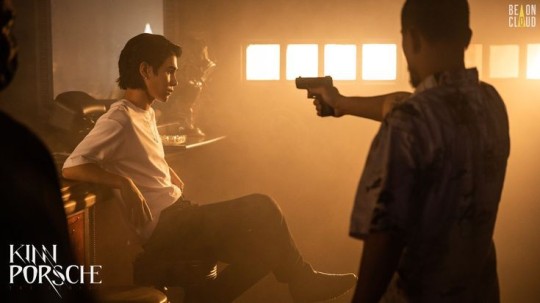
I’ve been thinking about this scene a lot lately, and I just have so many thoughts on it.
Like low-key, but imo what makes this scene so mesmerizing yet also chilling at the same time is the fact that Kim never eliminates the possibility of Chay turning around at any time and witnessing Kim kill in order to protect him.
Whereas Porsche tends to protect Chay by keeping him from seeing the reality of the mafia life (and tragically blindsides both himself and his brother because of it; Chay because he remains ignorant of his new environment and Porsche because his judgement of the risks in keeping Chay ignorant is impaired due to his overprotectiveness), Kim protects him only from the danger of it.
It’s an all around interesting narrative choice from BOC, especially considering that it’s Kim’s one fight scene in the entire series.
I’ve seen many posts on here before of how Kim leaves the dead bodies for Chay like a feral cat or that he really took the mantra “nobody disturbs my man” up a notch or two, and while I definitely agree with all that on a surface level, I can’t help but think there’s so much more going on. Dare I say, maybe even a little manipulative? Hmm.
Because for reals, there’s a reason why this fight scene makes such an impression on so many fans--the KimChay fans (including myself), in particular--and I think it’s because so much of the context of the fight, as much as the fight itself and the events leading up to it, reveals so much about Kim’s character post-break up w/ Chay.
Like yes, there’s the aesthetic reasons and ofc, Jeff Satur and that beautiful face of his that looks like it was sculpted on a Saturday by the gods, but there’s just so much to be said in the way he’d fought and more importantly, ended the fight.
@wildelydawn wrote up an amazing meta post about how Kim fights, for which I highly recommend y’all read if you haven’t already. I definitely agree with the idea that Kim likes to play with his prey when he fights; he knows how to improvise and use his environment as sources of weapons, and he’s definitely got a bit of a sadistic streak going for him, lol.
Now, where am I going with this? Well, let’s very briefly look at the events leading up to the fight: from the moment they break up in ep 11, to one of the very last scenes in ep 13 when Kim finds out that Porsche and Chay have left the tower, somewhere in between those events, Chay had become Kim’s singular goal and most important priority. Whereas before his goal had been to investigate Porsche and Chay’s connection to the Theerapanyakun family, directly after the break up is when this plotline falls through because his investigation hits a dead end at the temple.
For me personally, methinks it’s the moment he finds out that Chay skipped his college interview in ep 12 and what a massive fuck up he’d just committed. As much as I adore him as a character, I don’t really think he knew the repercussions of his own actions until it was too late, alas. Ultimately, he’s not responsible for Chay’s choices, but he can’t deny that his previous actions influenced them.
Whether it was wanting to confess his own feelings to Chay, or perhaps setting him straight because he skipped his college interview, or wanting to keep him safe, or even just to talk to him and clear the air--the point is, regardless of his reason(s), getting to Chay becomes his next target. And more than that, once Kim sets his crosshairs on a goal--especially on this one person he’s got a romantic attachment to--he is positively ruthless.
You barely see it from how fast the camera cuts out, but if you pause at just the right moment, you can see how Kim’s expression is absolutely seething when Korn stops him from going to look for the Kittisawasd brothers (or perhaps even just Chay himself).
This is the expression of someone who’s more than willing to obliterate anyone who gets in the way of him and his goal. This is an expression of utter resentment. This is the expression of someone who’s itching for a fight, because the universe dared to get in between him and his goal.
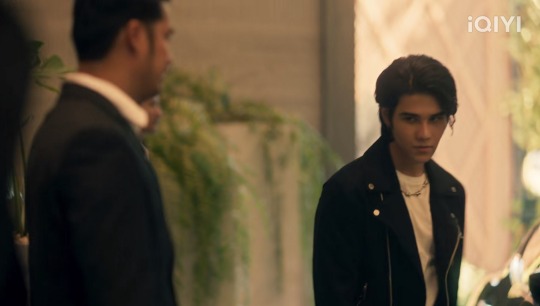
(Side bar: I’m pretty sure part of the reason Jeff got the role of Kim Theerapanyakun is because of how intense his method acting can be. He doesn’t have many roles under his belt just yet, but if you haven’t seen He She It, I recommend giving it a go. His acting in that mini drama is a little rough around the edges, but the raw intensity by which he plays the character of Mike definitely highlights some of Jeff’s natural talent. He knows how to act with his eyes and his entire body, and when given the right director to guide him, as we’ve seen when he portrays the role of Kim, he truly thrives in his role.)
Yet still, for all his anger at being prevented by his father from getting to his goal, he’s mindful enough to know that he can’t just go against his orders either. Korn is the enemy of an entirely different caliber, and Kim perfectly knows how and when to pick his battles.
But it isn’t until we see him in the next ep quietly watching Chay from the bar that another facet of his character growth is revealed to us: by this point in time, he’s comfortable in his feelings for Chay enough that he can finally allow himself to luxuriate in his presence, even whilst knowing he’s in the metaphorical dog house.
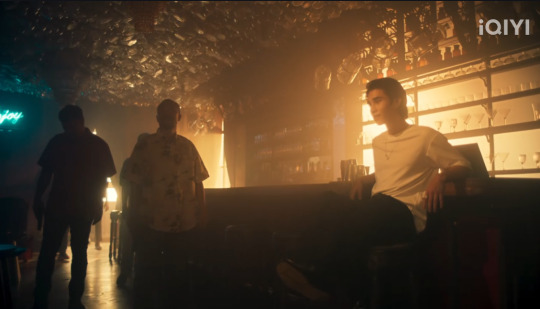
His arms are propped up, his legs are loosely crossed, his body language is relaxed, whilst still very much aware of his surroundings. Keep in mind, this is the first time since the morning of the kidnapping that we see him perfectly content in Chay’s presence, now fully aware that there’s no reason for lies between them anymore. The only one left is the one he has to fix.
Yet, after all this time of trying to get ahold of Chay ( @bitacrytic wrote an interesting piece about Kim’s unsettling behavior when he realized Chay had cut him off, which I also highly recommend), why didn’t he take the opportunity to talk (or whatever it is he intended to do) when he was finally within sight? The camera shot of Chay talking to Yok on his phone, as well as of Kim sitting on the stool, lingers for a good 20-25 secs, so the audience is given a hint that Kim has been there for a while.
So why not take advantage of this chance?
And the answer to this question, I think, is what’s at the heart of the matter and basically defines the connotation of the entire fight.
Kim is not a fool, he knows for the time being he’s number 1 on Chay’s shit list. And because of this, it may be a stretch to say it, but I will anyway: perhaps off screen, from the moment he had him within sight, Kim may have realized that it would do him no good to talk to Chay at that moment. Not when there’s an imminent threat lying in wait, not when the heartbreak is still too raw for both of them.
Most of all, Chay has no reason to trust him right now; it would just be a repeat of their disastrous confrontation in the club.
And he knows all too well that he cannot afford to sabotage what truly little standing he has left in Chay’s good graces. So he plays it cautious and takes the next best thing: he’ll bask in Chay’s presence, keep him company (albeit one-sided). If you scroll back up real quick and see his expression in the promotional image, it’s almost as if he’s thinking to himself, ‘keep your eyes on the prize--on him. he’s the only one that truly matters.’
But even so, Chay’s safety is his priority for the moment and there’s just so many reasons Kim is itching to vent some anger and frustration: the boy he loves has cut him off completely, Daddy is hatching up some plan again, besides the ongoing 4D chess game he’s got going on with all his sons, his investigation led him nowhere. Yet lo and behold, here comes some goons who not only disturbed his peaceful serotonin-gathering session (unbeknownst to Chay), but are also looking to either use the love of his life as leverage in a conflict that barely has anything to do with him, or just outright kill him.
Really, no one can blame Kim for going a little overboard, not when these poor suckers basically offered themselves to him on a silver platter. Lol
While I won’t go too deep into analyzing the physicality or choreography of the fight itself, I’d like to instead focus on all the things Kim chose/chose not to do, which again, says so much about his character and brings me back to my overarching thesis for this long ass rant: Kim never eliminates the possibility of Chay turning around at any time and witnessing Kim kill in order to protect him.
Kim doesn’t call out for Chay to run: this makes sense, it’s a practical choice; he doesn’t want these men to draw their attention on Chay. So long as they’re focused on him, so long as he distracts them--he can kill them one by one.
Kim doesn’t draw the men away from the bar: an interesting choice that seems like it never crosses Kim’s mind. He’s more than agile enough to have led them away from where they’d entered, yet he keeps them all inside.
Kim didn’t wait for them outside: another interesting choice. Arguably, it would have been more efficient for him to have taken some bodyguards and do a stake out. Further still, it’s also arguable this choice is more an emotional one (he wants Chay where he can see him, dammit), but that’s up for debate.
Kim waits until the last possible second to use a gun: a risky choice, but he pulled it off quite well. He doesn’t go for the gun until the goons have him surrounded within Chay’s vicinity, so he goes for fast kills to end the fight even if it’s not his personal preference. Imo, it’s very obvious throughout the fight that he finds some satisfaction in twisting limbs and breaking bone, so good on him that he got to indulge for a bit.
And finally, immediately right after the fight, he never tries to pull this one over Chay’s head:
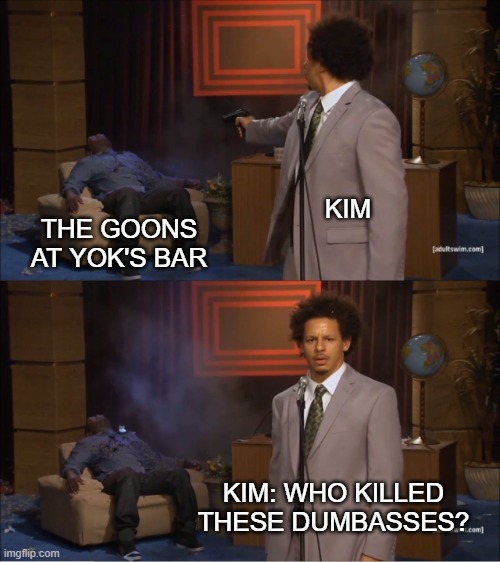
This one is pretty self-explanatory, I think. Hahaha.
But after Kim shoots the last man, he doesn’t linger for too long. Which again, why doesn’t he take advantage of yet another chance that’s fallen onto his lap to talk to Chay? The danger has been dealt with for now, after all. Why not at least attempt at some sort of clean up, maybe pile the bodies on one corner so Chay doesn’t trip over them? :’D If not to talk to Chay, why not at least linger in the shadows, to make sure Chay is all right (he’s bound to turn around eventually)?
Instead, he walks away, still panting a bit from the fighting and without a doubt, from the adrenaline rush. His body language is hard to read because his silhouette is blurred, but it’s at this point that BOC could have easily concluded this scene.
They could have left this scene as is, and made the aftermath of the fight as vague as possible, because for what it’s worth, it would have still accomplished one of the main points for KimChay: Kim’s priority is Chay’s immediate safety.
But it’s not the end of the scene. BOC made damn sure that we would see the aftermath, and with it--the changed dynamic between these two characters and the very implications of it. They didn’t leave it vague whatsoever, they pretty much shoved it in our faces.
This scene--this f*cking scene RIGHT HERE--blows wide open a potential trajectory of KimChay’s love story if/when we ever get a season 2.

I think for the first and only time in the show, this shot of Kim sitting on the stairway, enjoying a cigarette after a murder spree, mind you—is the first time we see him fully stripped away of any pretenses in not only the way he loves and protects someone, but how far he can get lost within his own emotions when he has no reason to hold back. He doesn’t even look the least bit concerned for Chay’s emotional well-being, because that’s not his priority when he chose to leave those men lying on the bar’s floors.
If anything, in this specific situation, not holding back benefits him greatly.
For the first time, his character in the show is explicitly elevated to the same level of batshit insane as Kinn and Vegas, perhaps even beyond them.
We’ve seen how WiK had won over Chay, of how tender Kim could be with him, but the fight in Yok’s bar and the conclusion of it afterwards, demonstrates how far Kim’s sharpest, most deadliest aspect of himself—Kimhan, will go in order to win back Chay. Even in trying to get Chay within his orbit once more, he remains just as calculating: he doesn’t let his own gut instinct (actually wanting to talk with Chay) get the better of him; he uses the situation, in this case--even Chay--to give himself the best advantage. Can you imagine how terrifying that is?
It’s no wonder Korn calls him the strongest, yet most dangerous of the Theerapanyakul heirs: regardless of whether Kim holds back or not depending on the given situation, he remains just as sharp, just as deadly, just as cunning. In the first KP novel, Korn presents a question to the readers indirectly: in their world, is love a weakness or is it strength?
For Kim, the answer is obvious: it’s a weakness, but he won’t allow it to be one for himself or for Chay.
And due to all this, there’s only one conclusion I can come up with as to what this shot of Kim sitting on the stairway outside Yok’s bar was trying to accomplish:
Kim—this conniving, devious, gorgeous motherfucker—absolutely wanted Chay to see the dead bodies now littering Yok’s bar.
In fact, I can even argue that he seemed to have been waiting for confirmation that Chay saw his “present.” That he had all the time in the world to make sure his bae got a good look at his kills.
Why, you ask? Simple. Kim trusts Chay’s backbone made of steel. He trusts him to be able to handle it. Why else would he let himself enjoy a smoke after killing 6 people in 6 mins? Why doesn’t he look concerned?! Why not give Chay some comfort, goddamn...! We know this fucker is in love w/ Chay, the dumbass was crying over his polaroids earlier that day. //sobs
But in all seriousness...Kim has firsthand experience of going up against it, doesn’t he? He himself saw how determined Chay could be when he cut himself off entirely from Kim, both from when he pulled his hand away in the club and then blocking his number a day or two later. I don’t necessarily think it’s that Kim overestimated Chay’s love for him, but rather he initially underestimated Chay’s resilience in keeping him away after breaking his heart so terribly.
This son of a bitch (affectionate) sobbed his pathetic heart out after finding out Chay blocked his number, probably took a good look at himself (and Chay’s cute polaroids), and came to one conclusion: “yeah, Chay can handle me. I can go all in now.”
In fairness, Chay’s steadfastness can only improve and strengthen from here on out. Kim--although in love with Chay, but does have his moments of volatile moods and cold verbal wit--is not an easy person to love, as Chay is slowly finding out the hard way. He must be able to confidently call Kim out when the latter needs to be reminded to respect him, that Chay will not take any of his shit.
Ironically enough, in creating an original story for these two characters in the show, it also brings them closer to the dynamic they have in the novel, imo. I myself have only read parts of the novel, and because we barely see KimChay in the book, it’s hard to tell how much closer show!KimChay is to novel!KimChay, but there’s hints of some similarities here and there in terms of character dynamics. Make of that what you will~
Let’s play Devil’s Advocate for a hot sec though, and address the rebuttal: “but won’t this only drive Chay further away from Kim and a life in the mafia?”
My answer to that is: will it though? Chay has more reasons to stay in the world Porsche forced him to enter than he ever has in leaving it. BOC cemented this fact when they decided to keep Namphueng alive, nevermind the fact that Chay’s one positive, healthy parental figure, is now the minor family head and as much as he’d like for it not to be true, he’s still in love with Kim.
But to reiterate, Kim trusts Chay’s backbone made of steel in a way that Porsche doesn’t (again, due to aforementioned overprotectiveness, which also serves as the fundamental difference in how they both protect Chay). But the reasoning behind placing his trust in Chay isn’t entirely selfless either.
He trusts Chay to be able to handle the disturbing scene of the dead bodies he left behind, because he has something to gain from it.
By leaving behind the dead goons for him to find, Kim inadvertently breaks another piece of Chay’s upright perception of the world, ensnares him further into Kim’s reality—and most of all, to Kim himself.
It’s a terrifying level of honesty (and wooing??) coming from Kim because it’s so brutal in its execution. What makes it even more frightening is that he’s genuinely doing this out of his desire to be with Chay. His priority during the fight is Chay’s safety, yes, but his overarching goal after their break up remains the same: to get Chay back.
It drives home the fact that although Kim loves only a handful of people in his life, he loves them fiercely to the point of questionable insanity.
#kinnporsche#kimchay#kim kimhan theerapanyakul#porchay pichaya kittisawat#meta#kinnporche the series#kpts meta
914 notes
·
View notes
Note
Seeing how Ford typically responds to situations based on logic, and considering how smart he is he’s a little too good at rationalizing not-so-great decisions, I think someone who has high emotional/social intelligence and empathy.
Yeah sure you’re not as good as he is with astrophysics and biochemistry and other such whatever, very few people are, but you have a frankly remarkable understanding of other people and their emotions, and as much as it initially bothers him, you give it to him like it is and not just what he wants to hear. Ford has always appreciated that about you.
I just love the idea of two people who are both equally very intelligent, just in different ways. Where one comes up short, the other thrives.
just my thoughts 💭 hope you’re having a nice day :>
It's funny because I think as you said, at first it would be quite unnerving to him.
Society in general considers intelligence to be defined by 'IQ' levels (which are bullshit anyway) and a person's books smarts, for want of a better word. Emotional intelligence isn't considered to be as desirable or as needed, and therefore you're not often perceived as being smart on the same level as someone who's a lawyer or something. Emotions are just as vital as theoretic knowledge, but they aren't considered as 'serving' a person's needs, however in actual fact, that's exactly why the world is the way that it currently is (imo): A lack of emotional intelligence.
I think Ford would be guilty of holding that belief throughout the majority his life, too. He's always relied on, and been told that, his IQ is all he needs and is more important. His emotions will make him weak and he's too smart to worry about all that.
If he met someone who was very capable of pulling apart their own/his/another person's behaviours and feelings and then combing through them to examine the factors that inform those reactions, I think it would be very jarring for him.
People often (in my experience) tend to feel quite exposed by that; it makes them 'vulnerable' because people like to hide how they feel in order to protect themselves, and they can get quite defensive over it. Which is very normal!
I think he would be similar in that regard. You'd have to do a lot of work around teaching him the tools to examine his own feelings and helping him communicate them, whilst gaining his trust to let him understand that you're not going to use that intimate knowledge of those emotions against him. You just truly want to help.
Where other people lack the insight, gently showing them their own dissected feelings is really helpful for getting them to understand them themselves and I do think that it can assist them in communicating their needs with less shame because they know you're a safe place to unload them.
I'm also suuuper biased to the balancing thing, as you said. Partnerships that compliment each other in that way are very cool to me. He's the brains, you're the heart. Not that the other isn't capable of either, but just that you each have your areas of expertise and are a bit better at it than the other. And that's okay.
Personally, I do think that high levels of emotional intelligence are on par with ability in things like astrophysics because they require very extensive work and study to examine and understand, just like any science. In math, for example, you have clear, defined answers, whereas with stuff like this, you have to be aware of SO much in terms of context and individuality, and a lot of it is undefined. It requires understanding on many different levels.
#im a bit (very) biased about emotions bc they mean a lot to me and they affect everything in my life very intensely#i would print out a big emotion wheel and traffic light system for Ford and tape it to the door of his lab for his bad days lol#asks#ford asks
18 notes
·
View notes